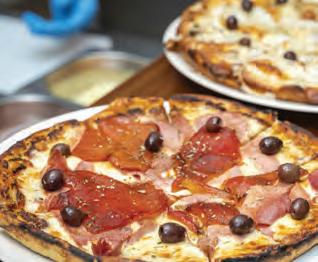BUSINESS LEADERS IN THE MIDDLE EAST 2025








Nicholas C. Cooksey Publisher & Editor in Chief
Dear Reader,
What drives a CEO to make bold decisions - whether it’s a strategic acquisition, a key hire, or a shift in direction? We often look to their success for inspiration and their failures for caution. These aren’t people trying to reinvent the wheel; they’re the ones setting it in motion.
Now in its third edition, Business Leaders in the Middle East brings together sharp insights from across the region. These aren’t mere interviews; they’re windows into how leadership is evolving in a world shaped by rapid digital transformation. Technology touches nearly every industry now, and these leaders show us how to navigate change with purpose.
& Director
Charlie H. Cooksey Co-Publisher
This special edition goes beyond business. We’ve travelled across cities and coastlines, explored iconic cars and luxury stays, and rounded up a fast-paced few months of news from the Gulf. As always, we bring you perspectives worth reading… and re-reading.
Regards,

Publisher & Editor in Chief Nicholas C. Cooksey
Co-Publisher & Director Charlie H. Cooksey
Editorial Deepika Rao
Editorial Contributors Yazan Neme
Angela Acosta
Andrea Raj
Vinita V.
Yara Bahman
Kyla Louise Reekie
Sales & Business
Development
James Brook
Njood Alatallah
Layout Designs Nikhil Parameswaran
Admin & Finance
Nikesh Pola
Photography Angelo Acosta
Distribution
Peter Anthony V. Lee Jr.
Delivery Point
Al Ayam
Published by:
Gulf Insider Media WLL Seef District, Manama Kingdom of Bahrain Tel. +973 1700 4575
Email: info@gulf-insider.com www.Gulf-Insider.com
Registered with Ministry of Information approval no. TFI-431©. No part of this publication may be reproduced in any manner without the written permission of the publisher. All Rights Reserved. Views expressed in this magazine are not necessarily those of the publisher.
Printed at Dar Akhbar Al Khaleej, Kingdom of Bahrain.
For advertising contact : Charlie Cooksey | +973 3652 0004 | charlie@gulf-insider.com
A few of our social media posts from last month. Don’t forget to like our Facebook page!

471K

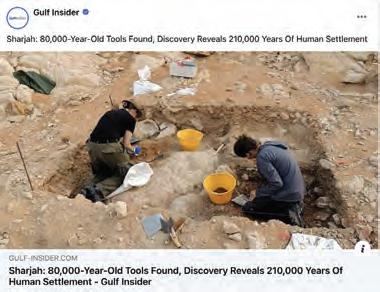
43.1K2.5K

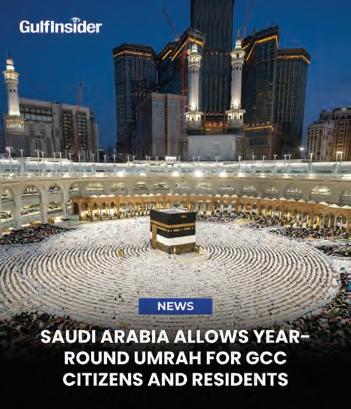
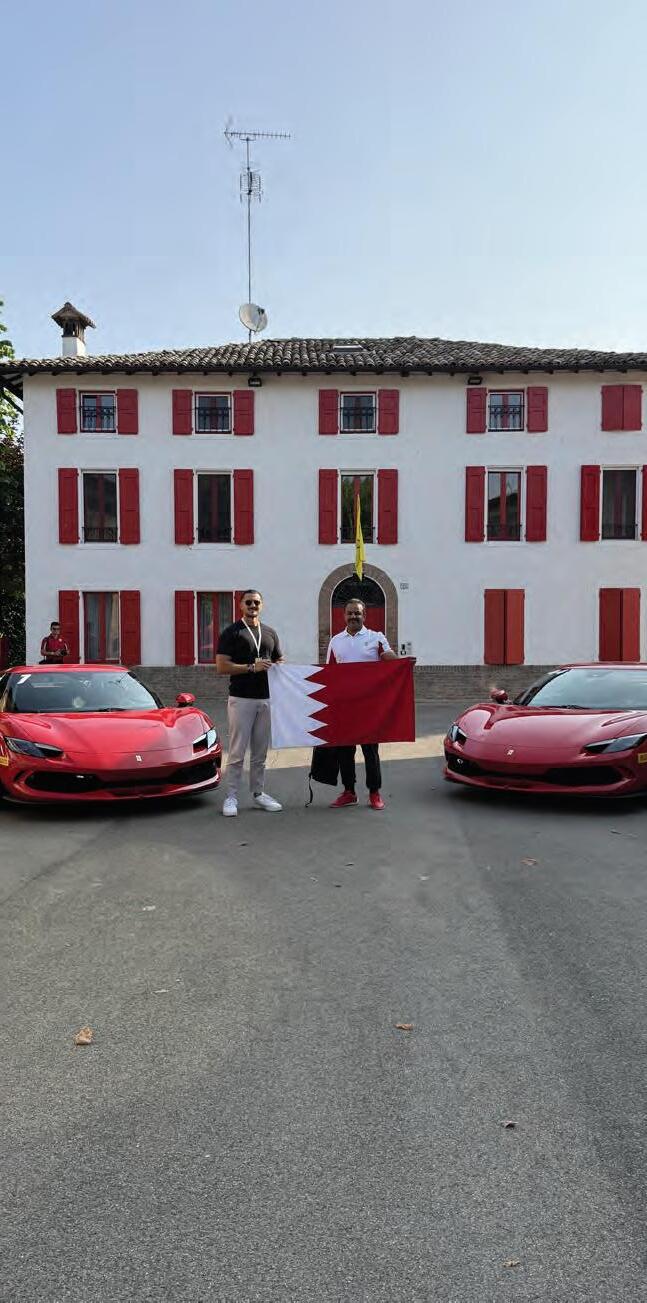
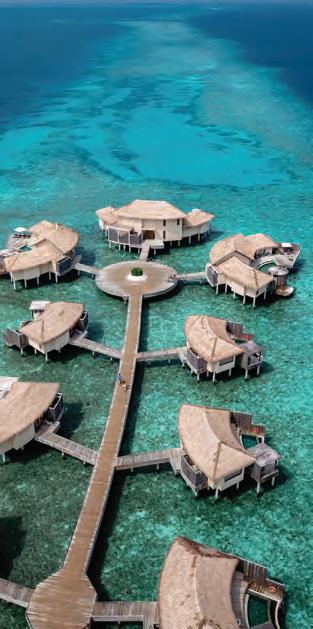
Business Leaders in the Middle East
Featuring innovators, decision makers, and those transforming their industries in the region.
Features
Stories that highlight elegant spaces for teams to gather; dialogues on health, safety, and environment, and providing students with premium educational experiences
Gulf Insider Motors
Reminiscing 10 years of Genesis Bahrain; all about building your own Porsche; a Lamborghini visit that’s one for the story books, and diving into data with Ferrari.
Gulf Insider Travel Diaries
From El Gouna’s coastal charm and island discoveries in the Maldives and the Seychelles to celebrating global culinary names. Society
A reflective look at the standout insights from Middle Eastern leaders, setting the tone for this year’s conversations on business, innovation, technology, and above all, leadership.

As we return to the Business Leaders in the Middle East this year, we are still reflecting on the lessons imparted through last year’s conversations with some of the region’s most dynamic and forward-thinking
individuals. These leaders gave us more than insights; they offered a glimpse into what it means to lead with clarity, vision and resilience in a fast-evolving environment.
From the electric vehicle shift to the intersection of wellness and innovation,
and the approach to empowering people in legacy organisations, the messages were clear. Leadership here is proactive, grounded and relentlessly people-focused.
The Middle East continues to navigate remarkable change across
multiple industries. With global disruption and regional diversification happening in tandem, leaders must now operate at the intersection of tradition and technology, customer expectations and operational excellence.
As we turn the page over to new conversations with more leaders across several industries, we’re embarking on a refresh, a lookback through the discussions of last year to recap: What is the current leadership context? What key developments and trends are shaping the industries? How are forwardthinking organisations maintaining their competitive edge?
The Leadership Context: Culture, Clarity and Commitment
A growing emphasis on cultural alignment, team building, and bigpicture thinking all mark today’s leadership journeys in the Middle East. Executives are creating workplaces where innovation is encouraged, professional development is prioritised, and team members feel heard and recognised.
A growing emphasis on cultural alignment, team building, and bigpicture thinking all mark today’s leadership journeys in the Middle East.
Leaders are also expected to maintain a fine balance between strategic foresight and operational responsiveness. Whether it is in retail, hospitality or construction, the expectation is to deliver results without compromising values.

Recognition, belonging and alignment are the real currency of leadership today.
Automotive Innovation: Customer-first and Electrified
The automotive sector is in the midst of a generational shift. Electric vehicles are becoming more than a global trend. They are shaping regional business models, infrastructure conversations and consumer expectations. Karl Hamer of Adamas Motors spoke to us about the shift to EVs and how customer convenience remains central to their strategy. Offering at-home chargers and enhancing in-person service centres are practical yet forward-thinking ways of building trust in an evolving market.
Meanwhile, Nawaf Al Zayani has drawn attention to the growing role of telematics and remote updates,
technologies that make cars smarter and servicing more efficient. These features, once futuristic, are now essential. With Chinese automotive brands leading in this space, the region is positioned to become a hub for advanced mobility solutions.
As consumer preferences evolve, so too must the experience of buying and owning a vehicle. The future lies in providing digital sophistication while preserving the tactile and emotional aspects of automotive retail.
Wellness and Healthcare: The Rise of Intelligent Wellbeing
Health and wellness are no longer confined to hospitals and clinics. They are becoming lifestyle decisions, informed by innovation, personalisation and global research.
Entrepreneurs like Yara J. Salman,

who has built a brand at the intersection of wellness and technology, are leading this shift. Her interest in biohacking and preventative health mirrors a broader trend in the region: optimising health through curated experiences and interventions.
The modern consumer is better informed and more proactive. They are seeking solutions that are both evidence-based and tailored to their individual needs. Business leaders in the healthcare space are responding with services that combine aesthetic care, clinical rigour and digital convenience.
To stay ahead, brands are tapping into global networks, attending specialised conferences and importing knowledge while localising delivery. The result is a healthcare landscape that is increasingly sophisticated, responsive and inclusive.
The acceleration of digital payment solutions in the Middle East reflects more than convenience. It signals a deeper transformation in how business
The fintech space is driving the region’s economic future, with more entrepreneurs leveraging AI tools, e-commerce platforms, and secure payment gateways.
is conducted and how consumers engage with services.
Visa Bahrain has highlighted how digital transformation is being embraced, particularly among womenled businesses. The fintech space is driving the region’s economic future, with more entrepreneurs leveraging AI tools, e-commerce platforms, and
secure payment gateways.
This shift also reflects a change in consumer behaviour. People are prioritising speed, security and access. Fintech platforms that simplify complex financial processes while maintaining high standards of transparency and usability are gaining traction.
What was once optional is fast becoming standard. Companies that want to stay relevant must think like technology firms, regardless of their core industry.
The development landscape across the Middle East calls for a careful balance between preserving heritage and meeting modern expectations. Yusuf Abdulatif Althawadi of Bahrain Marina Development Company W.L.L. talked to us about revitalising the historic Marina Club site and how it meant finding harmony between design, community relevance and commercial viability.
Today’s real estate projects are about more than buildings. They aim to create experiences and reflect
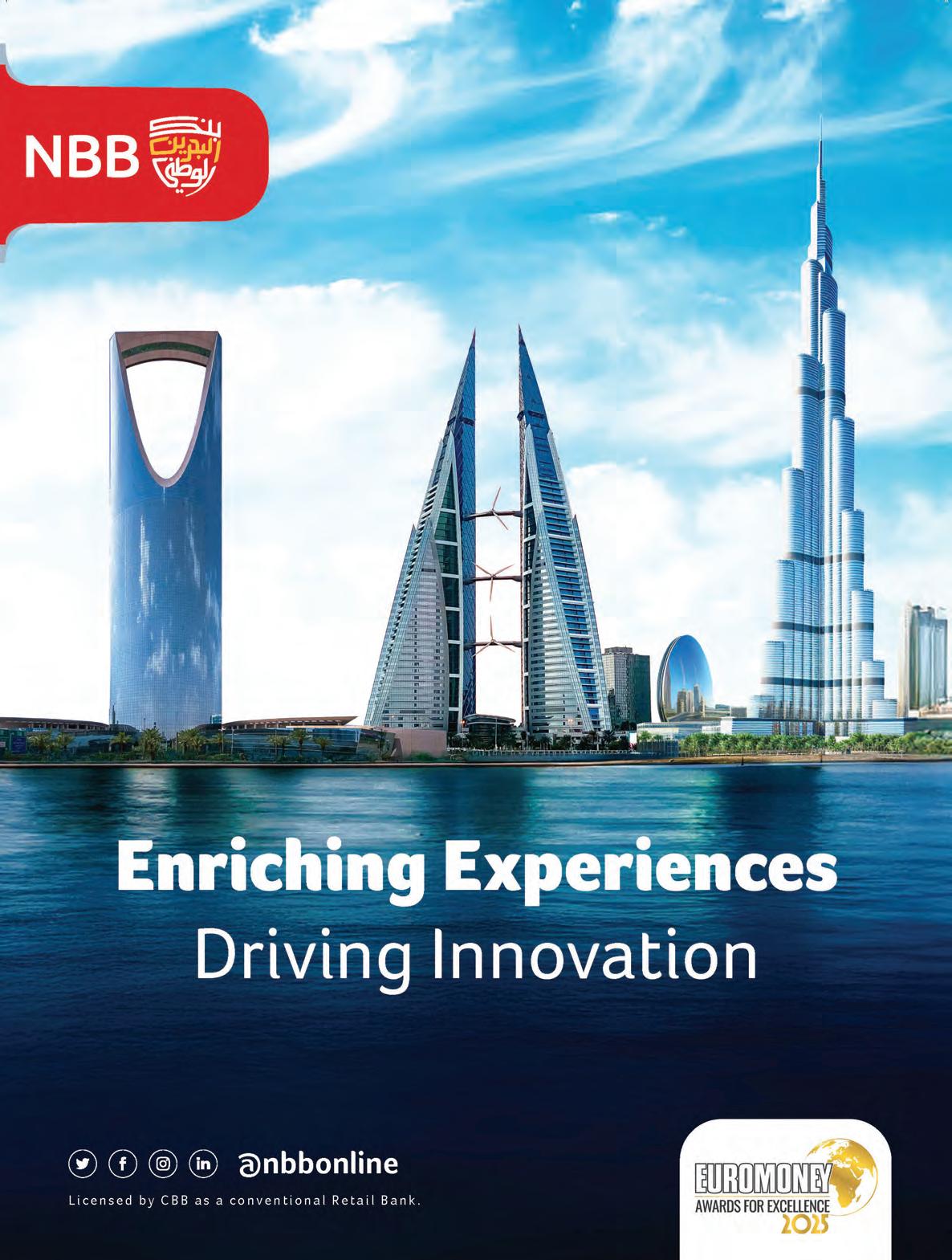
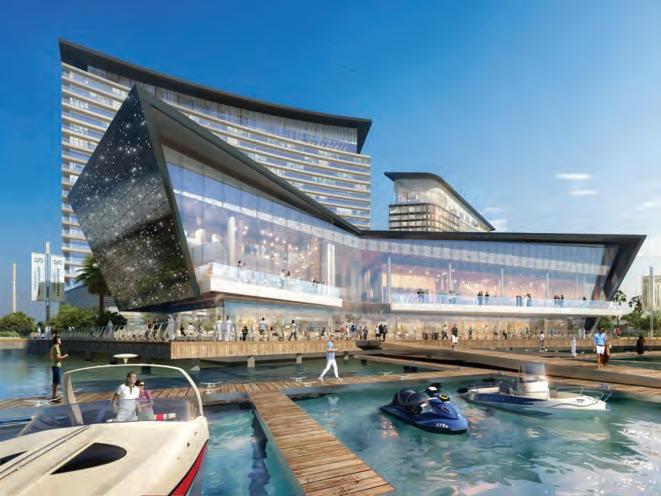
the values of the communities they serve. Developers must factor in public sentiment, lifestyle preferences and long-term sustainability, not just aesthetics or short-term profit.
This requires leaders to wear many hats – part architect, part sociologist and part strategist. Projects succeed when they offer both functionality and emotional connection.
In the food delivery sector, brands like Talabat have transformed customer expectations by integrating logistics, quality assurance and responsive service into a single ecosystem. As Moaied Aqel emphasised, speed and reliability have become the defining qualities of a premium experience.
But it is not only about the external experience. Internally, organisations are fostering team cultures where creativity, ownership and collaboration are prioritised. A motivated team translates directly into a better customer journey.
The convenience tech industry has become a benchmark for how businesses can scale without losing their service standards. In a market
The convenience tech industry has become a benchmark for how businesses can scale without losing their service standards.
where convenience is currency, operational excellence is the key differentiator.
In the education sector, personalisation is more than a buzzword. It is being embedded into the very structure of learning environments. Nadim M. Nsouli of Inspired spoke of adaptive learning technologies that respond to individual student needs, creating an educational journey that is both challenging and supportive.
These technologies not only engage students but also empower teachers. With real-time insights and performance data, educators can make informed decisions and address gaps proactively. The approach fosters resilience, curiosity and self-motivation in students.
For educational institutions, the challenge is integrating technology without diluting human connection. The best results come from platforms that enhance the classroom, not replace it.
As industries evolve, the qualities that define effective leadership are becoming increasingly clear. Success is built on adaptability, strategic vision and genuine human insight. The leaders shaping the Middle East today are those who:
● Anticipate emerging trends through global exposure and local insight
● Place customers and teams at the centre of every strategic decision
● Build resilience through digital transformation and operational agility
● Champion cultures that inspire innovation, ownership and belonging
With great takeaways from the previous year, this special edition stays true to its purpose - bringing insightful conversations on leadership, innovation, customers, and trends from across industries.
Business Leaders in the Middle East 2025 continues to highlight individuals and organisations setting new standards.Their stories offer more than inspiration.They provide a roadmap for navigating change with integrity, clarity and purpose
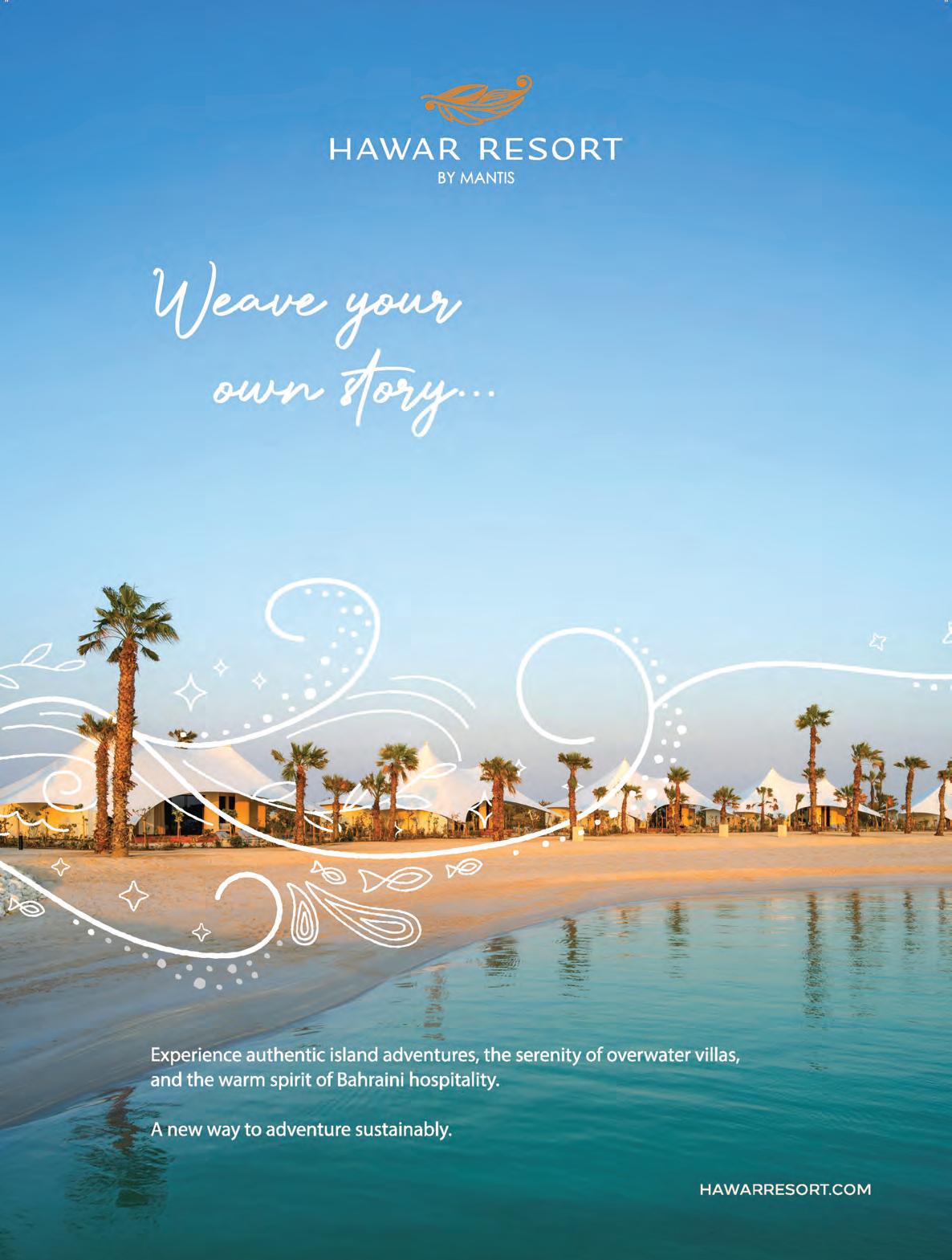
Usman Ahmed, Group Chief Executive Officer of the National Bank of Bahrain, discusses the bank’s role in supporting Bahrain’s financial stability, its community focus, and how it’s embracing digital innovation amid shifting scenarios in this exclusive interview.
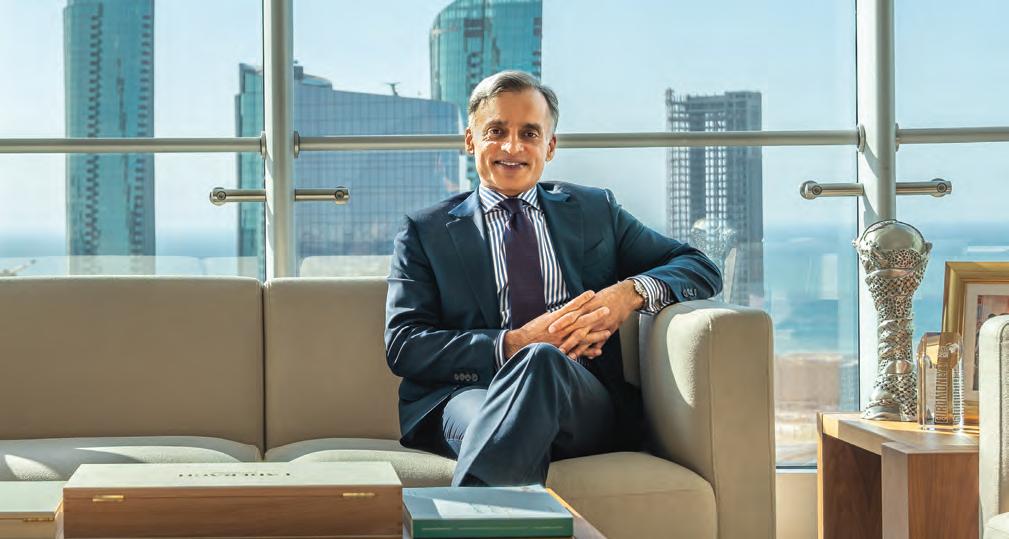
How is NBB leveraging the fintech ecosystem to improve customer experience and access to services?
The FinTech ecosystem in Bahrain has flourished thanks to a progressive regulatory framework. At NBB, We see great value in collaborating with FinTechs to enhance niche customer experiences and expand our offerings. We’re exploring partnership models in the UAE and Saudi Arabia, using our commercial banking licences to offer banking-as-a-service.
Recently, we partnered with a FinTech to introduce digital ID verification on our retail app. FinTech involvement has broadened the industry’s scope, and we remain committed to both partnerships and investing in best-in-class digital services for our customers.
What unique leadership challenges and opportunities come with heading a major bank in Bahrain’s evolving financial landscape?
As Bahrain’s largest domestic bank and a systemically important financial
institution, NBB carries a responsibility that goes beyond serving customers, shareholders, and employees. Everything we do, whether it’s product development, liquidity management, or resilience planning, supports not only our growth but also the soundness and stability of the broader financial sector. We view challenges as opportunities, always asking how we can better serve our customers and grow sustainably. Today’s challenges are deeply tied to the broader environment, including geopolitical shifts. Being prepared for turbulence and adapting to rapidly
changing scenarios is crucial.
Another significant challenge is balancing innovation with legacy operations. We are rapidly investing in new technologies while still running a full-service bricks and mortar network. Unlike FinTechs, we have an extensive nationwide branch network in Bahrain and also have a presence in the UAE and Saudi Arabia. Whilst this multiplicity of channels offers our diverse customers in Bahrain the ability

We are rapidly investing in the latest technologies while running a full service branch network, offering our customers a ‘best of both worlds’ experience.
to choose from the best of both worlds, it comes with its associated challenges from an infrastructure perspective. However, we are proud of the role that the National Bank of Bahrain plays in the wider economy and optimise investments to serve all segments of society.
This dual responsibility means we must serve all customer segments across both digital and traditional channels. It’s a delicate balancing act - but one that’s central to our role in supporting a resilient, inclusive, and forward-thinking financial ecosystem in Bahrain and beyond.
Technology is rapidly transforming the finance and banking industry. How are you (as a leader) and NBB’s team responding to it, both in mindset and in skillset?
It all begins with a digital-first mindset. At NBB, we focus on serving
customers efficiently and conveniently through mobile platforms. This requires not only technology but also internal capabilities, so we continuously upskill our teams, including AI training and internal innovation contests. We also partner with accelerators to support Bahrain’s wider tech ecosystem.
Our tech strategy revolves around three pillars: serving customers, running the bank, and protecting it. Across all, we prioritise agility, innovation, and staying ahead of the curve.
In terms of customer experiences in the broader industry, what trends have surprised you in the last few years?
The scale of personalisation enabled by technology has been surprising. What’s fascinating is how it’s blurred sector boundaries; financial services are no longer delivered just by banks or fintechs. Today, you find them embedded in e-commerce platforms, delivery apps, and even telecom providers.
Technology has expanded the landscape, allowing diverse industries to offer financial services through personalised, cross-sector value propositions. Watching this unfold has been remarkable, and the pace of change is accelerating. With AI, we can expect even greater hyperpersonalisation in the years to come, reshaping how customers engage with services across the board.
What changes do you foresee in the financial services industry over the next few years?
The key prediction is to expect the unexpected. Just 12 to 18 months ago, few would have anticipated AI’s pivotal role in finance, and that unpredictability will persist.
Another major trend is the acceleration of tokenisation. Fractional ownership and using tokens as alternative stores of value or mediums of exchange, whether for retail or corporate clients, will become increasingly significant.
Quantum computing is also worth watching. While its real-world
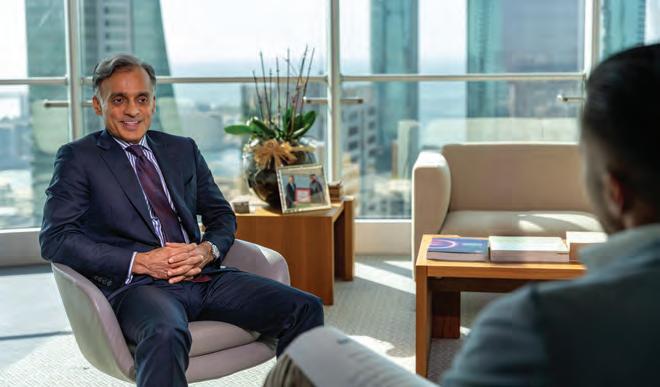
applications are still evolving, it holds vast potential to disrupt the sector. Tokenisation seems clearer in its scalability, but quantum computing could well be the next big surprise in financial innovation.
Can you tell us a little about your decisionmaking process when faced with a crisis?
Fortunately, since joining NBB, I haven’t faced a crisis as massive as the COVID-19 pandemic. However, during the recent geopolitical tensions, we came close. The heightened uncertainty pushed us to activate elements of our crisis management playbook, evaluating business continuity, reassessing physical operations, and strengthening our balance sheet for liquidity and resilience.
It was a valuable exercise in preparedness. While every day involves decision-making, it’s the tough, unexpected moments that truly test leadership. Responding swiftly, and being ready to take on a crisis are qualities that leaders need to build long before facing a challenge.
Engaging both the management team and wider organisation is vital; not just to reach the best decision, but to ensure execution buy-in. I focus on clearly explaining the ‘why’, listening carefully, and aligning decisions with our long-term vision and strategy. Day to day, prompt decision-making is essential. It’s important not to become a bottleneck that slows down progress across the organisation.
With AI, we can expect even greater hyperpersonalisation in the years to come, reshaping how customers engage with services across the board.
Faced with global economic volatility, what qualities do leaders in this industry and their teams need to stay relevant and competitive?
When we refreshed our organisational values, we identified four key traits. First, agility is essential in an unpredictable, fast-changing environment with new technologies and disruptors. Second, a mindset of innovation, both individually and collectively. Third, ownership - the ability to drive decisions and execution. The fourth trait, undeniably, is collaboration. These qualities underpin effective leadership. and go hand-inhand with transparency and strong communication.
What are some of the bank’s initiatives aimed at SMEs, small, medium enterprises and underserved communities in Bahrain?
The SME segment is vital for any economy, and at NBB, we are deeply committed to supporting it. We are upgrading our SME business model, designating specific branches across Bahrain as SME centres to provide dedicated services. We are also investing in technology, rolling out our revamped corporate online banking platform for SMEs. Additional relationship managers are being hired, and lending programmes are being revamped and expanded in partnership with Tamkeen, for both NBB and our Islamic subsidiary, Bahrain Islamic Bank. We are also streamlining SME onboarding through digital platforms. Regionally, in the UAE, we have hired staff focused on SMEs, and in Saudi Arabia, we collaborate with financing companies that serve the sector, supporting them indirectly.
Beyond business, NBB allocates up to 5% of net profits annually towards community initiatives, with key focus areas including social welfare, health, youth and education, and national initiatives. We partner with organisations like the Zakat Fund and INJAZ Bahrain, support talent development in the tech sector, and run innovation-focused activities such as hackathons. In health, we fund awareness campaigns, infrastructure, and supplies. We also align with Bahrain’s Vision 2030, ensuring our people, capabilities, and sponsorships contribute meaningfully to national development.
How do you deal with pushback or resistance to organisational changes you implement?
It’s essential to explain changes in the context of the bank’s long-term strategy and vision. Organisational structures evolve to enhance focus, launch new business lines or better serve customers. We make sure that every change offers growth, learning, and mobility opportunities. Clear communication and a sincere purpose help ensure changes benefit both the organisation and individuals, while improving customer service.

Ahmed ElKaffass, Visa’s Country Manager for Bahrain, reflects on how the Kingdom is reshaping the remittance experience - making cross-border payments simpler, faster, and more in tune with people’s lives.

For thousands in Bahrain, sending money abroad isn’t just a monthly routine – it’s a story shaped by care and connection. While many transactions are personal, around half
are tied to business activity — typically for investments, paying for goods, or purchasing property.
Bahrain stands out among remittance corridors, with the highest amount remitted per transaction. As digital
transformation accelerates and money movement trends change, remittance services must evolve – not just to keep pace but to match the digital lives and rising expectations of the people they serve.
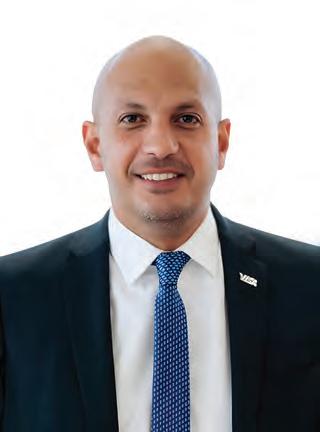
Remittances in Bahrain are more than transactions — they are lifelines connecting people, businesses, and economies.
Many residents in Bahrain are seeking more from cross-border remittance systems. Over 7 in 10 have expressed concerns about sending money abroad — especially the lack of customer support. Cost is another critical barrier, with high transfer fees and poor exchange rates making remittances less accessible.
Beyond these pain points lies a broader disconnect. Whether ordering food or sending money home, we expect services to be quick, clear, and give us control. That’s why interoperability matters. When systems don’t speak to one another, users face delays and inconsistencies. The benchmark has shifted. Financial institutions, fintechs and exchange houses that succeed will be those who recognise this shift and design intuitive, inclusive, and seamless experiences, not just regulatory compliance.
While bank transfers remain the most common method, mobile payment apps are gaining traction as digital habits evolve. Exchange houses still meet some needs but often fall short for younger, digital-first users. This shift aligns with broader goals for digital transformation and inclusion.
What’s needed now is purposeful action. Institutions can ease remittance friction by addressing hidden fees, outdated systems, and complex identification processes. With the right infrastructure, transfers can happen in real time. Simpler methods like using mobile numbers instead of IBANs help users feel seen and supported, especially in a country as diverse as Bahrain.
With forward-looking policies and digitally connected communities, Bahrain is helping shape the future of remittance. Products like Visa+, which enable alias-based cross-border payments using mobile numbers, showcase this potential.
With forwardlooking policies and digitally connected communities, Bahrain is helping shape the future of remittance.
Visa+ can make transactions faster, safer, and more private, while improving system connectivity. By reducing intermediaries, it helps cut costs and enhances reliability and transparency. It also supports financial inclusion — empowering small businesses and giving regulators better tools to monitor transactions and prevent fraud.
Remittances in Bahrain are more than transactions — they are lifelines connecting people, businesses, and economies. The ask is clear: make it fast, secure, and easy. At Visa, we believe the future of payments is human-centred — enhancing not just technology, but the connections that matter most. Bahrain is well positioned to lead in transforming remittance services into seamless experiences defined by trust, accessibility, and effortless connectivity.
Khalid Al Rumaihi is the Executive Chairman of Amriya Group, a Bahrain-based hospitality operator that introduced iconic F&B names such as Masso, The Orangery, and Lyra to the Kingdom. In this interview, Al Rumaihi talks to us about mastering the art of building original dining concepts that rival global names, navigating challenges and how entertainment, data, and talent are shaping the future of hospitality.
What was the original problem or gap you set out to solve when establishing the Palmyard Hotel?
Right from the outset, our aim at Amriya Group was to create unique hospitality and dining experiences that rival those we encounter in Europe when travelling. Generic brands dominated hotels in the country, and restaurants lacked the ambience, chefs, and service levels found abroad. We saw a gap that could be filled - and that was the inspiration behind the Palmyard Hotel.
Building on that same vision, we set out to create F&B concepts that reflected the same commitment to quality, originality, and atmosphere. This led to the birth of Masso, the Orangery, Circa, and more recently, Lyra. Our F&B brands have exceptional food at their core - nothing short of what you’d find in London or elsewhere - and we aim to hire the best chefs and managers to deliver first-class experiences to our guests. Our vision is to take these independent, home-grown Bahraini brands abroad and prove that Bahrain can be a creator and exporter of worldclass concepts, not just a consumer of them.
What milestones has the company achieved in the last two years?
We’ve had an amazing journey

since COVID. We were very proud to see Masso recognised as one of the top 50 restaurants by 50 Best in MENA in 2023 - one of only three restaurants in Bahrain to make the list that year. We opened our third branch of Orangery in Liwan in 2023, and in 2024, we launched our newest GreekMediterranean brand, Lyra, at Vida Hotel in Marassi.

Organisational change tends to be problematic when you hire the wrong people.
With Lyra, we hand-picked Chef Ilias (a European-trained Greek chef) to lead the kitchen team, and collaborated with a London-based designer to create a stunning venue. We believe Lyra has global potential - much like Masso and Orangery - and it truly has to be experienced to understand how proud we are of this latest addition to our portfolio of brands. We take great pride in building these home-grown concepts, which we believe can compete with the best global F&B brands entering the country.
Can you recall a particularly difficult moment for your company over the last few years? How did you and your team deal with it?
COVID was a shock to the hospitality industry globally. For nearly 12 months, hotels and restaurants had hardly any customers.
Although Bahrain remained open and
typically relies on visitors from Saudi Arabia, the absence of international travellers deeply affected the sector. It was a critical period for hospitality, and many restaurants didn’t survive. We were very fortunate in Bahrain to have the support of the government for businesses, as well as the decision not to impose a full lockdown like many other countries.
At Amriya, we recognised the situation was only temporary - and that taking care of our team was essential if we were to return stronger when the world reopened. Rather than sending staff back home, we ensured they had food and accommodation, even during periods when they weren’t working. Our people are at the heart of everything we do, and we knew they’d be instrumental in our recovery once guests started coming back.
This downtime also became an opportunity to reinvent. Menus at Masso and the Orangery were thoughtfully reimagined - with weeks spent developing and testing new dishes to delight returning customers. By staying true to our principles and supporting our people, we emerged from COVID stronger than ever.
How do you navigate pushback or resistance to organisational changes you implement?
Communication is key. You have to explain to your team why you’re making changes and what purpose they serve. You need to share the vision of where you’re going and how those changes will help you get there.
Organisational change is often difficult, and people don’t always respond well, especially to new reporting lines. But I’ve found that in these moments, two things matter most: first, you need to overcommunicate so people clearly understand what you’re trying to achieve; and second, you need to hire great people who genuinely make a difference to how you operate.
I believe it’s the second part that’s critical. Organisational change tends to be problematic when you hire the wrong people. But when you hire the right ones, you gain far more

We collaborate with some of the best designers and consultants to ensure that what we create stands shoulder to shoulder with the top F&B brands.
acceptance and belief in both the changes and the direction you’re heading.
That’s why I take recruitment very seriously. I consider it one of my main responsibilities as a leader to find and recruit the best people for the organisation.
What do you believe Amriya Group does better than anyone else in the region?
That’s a difficult question to answer, especially because there are many
truly world-class F&B operators in the region. I’d rephrase it by saying what we do exceptionally well - and what we share with some of the operators I admire most - it’s our ability to create independent brands from scratch that genuinely rival global industry leaders.
We approach the creative process with deep intention, spending atleast 18 to 24 months before opening a venue. Every detail is consideredfrom the menu development in close collaboration with the chef, to the design and layout, branding, uniforms, and overall guest experience. We collaborate with top-tier designers and consultants to ensure each concept stands shoulder-to-shoulder with the world’s best. Very few operators take that time, or have the capability to build something original repeatedly.
We started with Masso and asked ourselves: can we do this again? And Orangery was the result. Today, we believe Lyra is our third creation that will be just as successful as the first two.
There are operators in the region I deeply admire for sharing our valuesparticularly those with a family-business mindset and an independent spirit. It would certainly be easier to franchise a global concept. But we take pride in building something from the ground up, and proving that Bahraini-born brands can be just as successful as franchise models.
And to us, this is just the beginning. We hire employees who are as passionate as we are about refining each brand and realising the dream of seeing them thrive in some of the world’s largest cities.
How are AI and digital transformation reshaping your industry? How are you and your team preparing for it, both in mindset and skillset?
I’m still exploring how AI could be relevant to our industry. But we’re starting by ensuring we digitise as much of the data we collect as possible, so we can make smarter decisions. I believe AI will help F&B brands become significantly more efficient in areas like menu engineering, table bookings and seating management, targeted
marketing, food cost control, and more. We’ve now almost fully digitised all the key information needed to mine data effectively and use it to enhance our guest experience while managing the business more efficiently. Finding the right tools and resources to analyse that data and generate meaningful recommendations is something I’m actively exploring.
If we can’t find off-the-shelf AI solutions that suit our needs, we may consider developing our tools. But I do not doubt that AI will positively impact our business.
In terms of customer experience, what trends have surprised you in the last few years?
Probably the most glaring trend I’ve noticed is the shift away from formal dining experiences, like the Michelinstarred, 12-course tasting menus, and the growing desire for a more casual, sensory-driven experience. Nightclubs are seemingly fading away. Today, people want to eat and be entertained. They’re looking for great food, good music (often live), and a space where they can socialise.
That’s why we’re seeing the rise of private clubs where guests can dine and then stay on for live music or entertainment without leaving the venue. The growing number of small speakeasy-style spaces within restaurants also reflects this trend. In many ways, restaurants have become the new nightclubs.
So, it’s now essential to deliver not just great food, but a full entertainment experience. That’s why DJs are increasingly present in restaurants. But it would be a mistake to think entertainment alone is enough. No matter how much a guest enjoys the ambience, what truly keeps them coming back is an exceptional dish or two that they crave to experience again. While trends may shift, one thing remains constant: successful restaurants must consistently deliver an outstanding food and service experience. Without that, no amount of entertainment will keep guests returning.

At Action Labs, Co-Founder and CEO, Shaikha AlSeddiqi and her team are all about setting the trend rather than following it. The Bahrain-based Growth Consultancy is leading the charge with AI, insight, and agility to transform business across key industries. Shaikha tells us more.

What was the original problem or gap you set out to solve when starting Action Labs?
Before 2021, we were running a creative agency. But when the COVID-19 pandemic hit, we noticed a clear shift. More CEOs and board members started approaching us not for running campaigns, but for strategic and technical guidance. We had prior experience running a tech company so, we were able to blend that technical know-how with our
creative capabilities. It became clear that there was a real need for a partner who could speak both languages, creative and technical, with a genuine interest in helping businesses grow. That’s when the transition to a consultancy started to make sense.
What milestones have you and the team achieved in the last two years?
Over the past two years, we’ve reached several significant milestones. We’ve won multiple global awards, but what matters more is the impact we’ve had on our clients. We’ve helped
transform several FinTech brands into market leaders, achieving million-dollar growth in less than a year; that, to us, is our biggest accomplishment.
Today, we work with some of the largest financial institutions in Bahrain and across the region. We’ve also launched our own FinTech podcast, Swalef Tech, which is now gearing up for its second season with a major global sponsor on board.
On the tech front, we’re making serious investments in AI. Our team is incredibly passionate about it. In fact, our co-founder recently launched a regional think tank dedicated to exploring how AI can address social and economic challenges in the Gulf. It’s something we’re very proud of, and it reflects our long-term vision to stay ahead and create meaningful, lasting impact.
Can you recall a particularly difficult moment for your company over the last few years? How did you deal with it?
One of the toughest challenges we faced was scaling. While it all looked exciting from the outside, success came with a lot of pressure behind the scenes. We found ourselves working non-stop, often competing with global firms. There were times it felt like we were living at the office.
What helped us get through it was our core team. We’ve been together for years and have built a strong foundation of trust and support. That kind of camaraderie makes a huge difference when you’re facing tough times. It helped us maintain our culture and keep going.
The biggest takeaway for us was simple but powerful: if you’re not

Our clients’ success drives every decision we make, whether it’s strategic, creative, or technical.
hacking is still relatively new in the Gulf. Since we’re deeply rooted in tech, we often find ourselves pushing boundaries. But we believe culture is built on trust. When there’s trust, change doesn’t feel disruptive it becomes a shared opportunity.
We’re always transparent about what we’re doing and why. That clarity builds real buy-in, people feel more included in the process; helping turn resistance into alignment.

evolving and innovating from within, someone else will. That mindset fuels everything we do. We constantly ask ourselves: how do we improve? How do we create more impact? How do we stay relevant and efficient? Staying agile has always helped us stay ahead.
How do you navigate pushback or resistance to the organisational changes you implement?
Resistance to change is human nature. People naturally cling to what they’re familiar with. That said, most of our clients today are surprisingly open to innovation especially given how quickly technology is evolving. We work closely with them every step of the way, helping them adopt to new tools, platforms, and shifting mindsets. We see ourselves as one team with our clients, growing together. Our approach to data and growth
What do you believe Action Labs does better than others in the region?
It’s something we think about often. Internally, we always say, “Let’s focus on what we do, not what others are doing.” In fact, we ask our clients this question regularly, because their perspective matters most.
What we’re hearing is that many large corporates are moving over to us after seeing the results we deliver. They often tell us that we’re using data in ways they haven’t seen before.
Our clients’ success drives every decision we make, whether it’s strategic, creative, or technical. One of the things that sets us apart is how integrated we are. Everything - from strategy to execution - happens inhouse, across media, production, social, CGI, data, and events. That allows us to move fast, stay aligned, and maintain full control. Clients love that
and it creates a faster, more responsive feedback loop, and that’s rare.
How are AI and digital transformation reshaping your industry? How are you and your team preparing for it, both in mindset and in skillset?
AI and digital transformation are no longer buzzwords. They’re redefining how value is created, delivered, and measured.
We always say that software is just software; it’s all about how you use it. Many companies today are underestimating just how fast AI is moving. Some global organisations already complete 50 percent of their operations using AI, replacing human roles in the process. We’re very hands-on with the latest public and beta-stage technology - both software and hardware. For us, AI isn’t just a trend; it’s a tool we’re actively integrating into our work. We’re making sure both our business model and our team are future-ready. It’s a top priority for us and for our clients.
In terms of customer experiences, what trends have surprised you in the last few years?
We were early adopters of platforms like TikTok and have worked directly with their team for years. What surprised us was how slow some regional brands were to adapt. Many waited too long; even when the data was right there.
There’s still a gap in understanding how consumer behaviour has evolved. Take second-screen behaviour; it’s often seen as a challenge, especially for longform content. But it actually reveals what today’s consumers are looking for: speed, ease, and personalisation.
Attention spans have collapsed. If you thought you had ten seconds, now you’ve got two. That impacts everything: your messaging, creative execution, and platform strategy.
Hyper-personalisation is no longer optional. It’s expected. So we’ve made it a priority for all our clients, helping them turn that shift into a powerful growth opportunity.
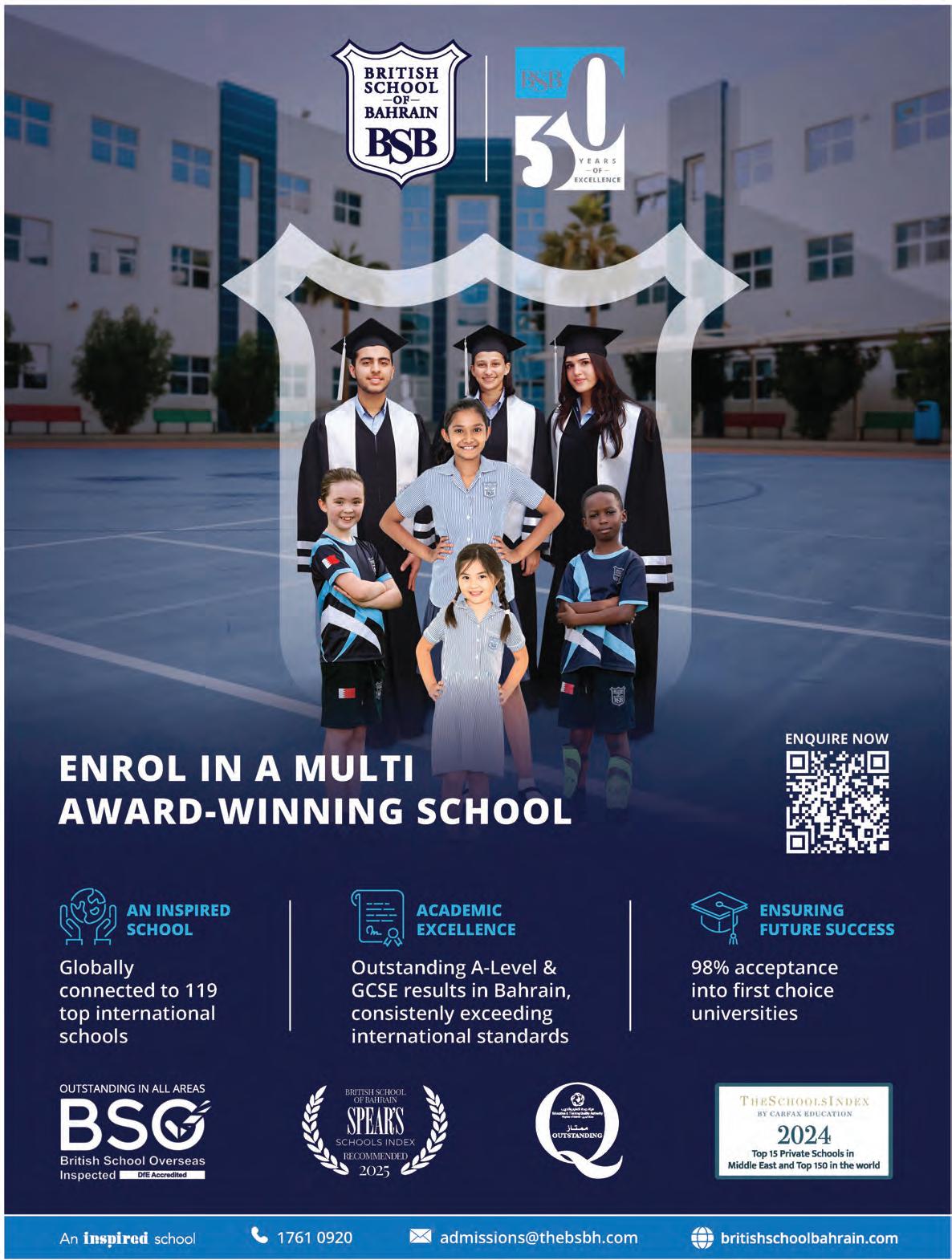
Abdulla Al Shaibani, CEO of Alphabeta Properties, has built his venture with an aim to contribute significantly to the architectural and cultural fabric of Dubai. In this interview, he dives into the trends shaping the UAE’s real estate landscape and how thoughtful design, tenant satisfaction, and digital transformation are redefining modern living.
What led you to establish Alphabeta Properties?
When starting Alphabeta Properties, we originally set out to offer a much higher quality rental product in Dubai’s real estate market. The goal was to raise the standard, both in terms of design and service. From the beginning, our ambition has been to become Dubai’s leading build-tolease developer, with a clear focus on delivering well-designed, purpose-built spaces for tenants.
What milestones has the company achieved in the last two years?
With M77, we introduced the UAE’s first-ever rental auction model, completely redefining how rental units are leased and challenging conventional market norms. It was a bold concept, and the response proved its value.
In a groundbreaking achievement, all units on the rental auction in M77 were fully booked within a mere two weeks of the rental auction, establishing a new benchmark in the Dubai real estate landscape. Despite the competitive market, an impressive 70% of bidders opted for the ‘rent now’ option, securing their residences at M77 at a premium of 60% above the market value.
Q-East is our most ambitious project so far and marks a major milestone for Alphabeta Properties, with its launch scheduled for Q4 of this year. Located in Al Quoz, it’s a mixed-use
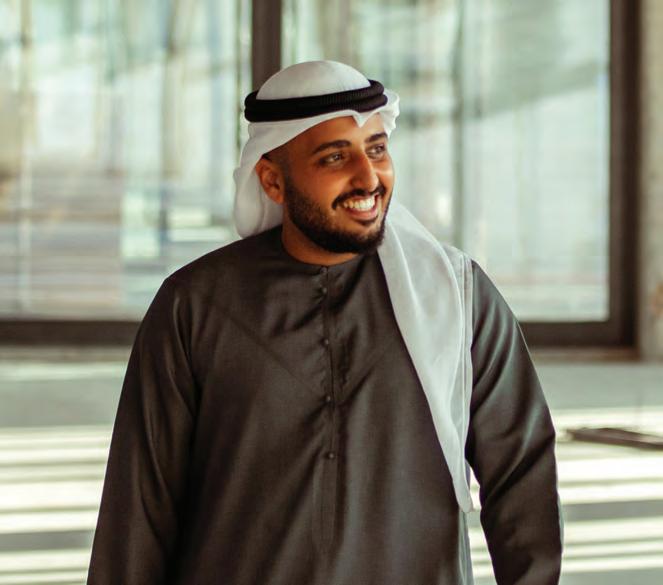
development that brings together residential, retail, and commercial components in a way that aligns with how people live and work today.
Al Quoz has long been recognised for its industrial and creative energy, and with Q-East, we’re building on that foundation to introduce a more modern, thoughtfully designed community. The development features a mix of highend penthouses, versatile commercial spaces, and retail spaces, all designed to add lasting value to the area and
raise the standard for what’s expected in this part of the city.
Can you recall a particularly difficult moment for your company over the last few years? How did you and your team deal with it?
The rapid growth of the UAE’s construction market has brought with it rising costs and frequent material delays. The real challenge has been delivering projects on time and within

budget, without ever compromising on quality. To manage this, we’ve had to stay agile, plan with precision, and collaborate closely with our partners, ensuring that even under pressure, our standards remain consistently high.
How do you navigate pushback or resistance to organisational changes you implement?
When it comes to implementing new policies or changes, we take a measured and thoughtful approach.
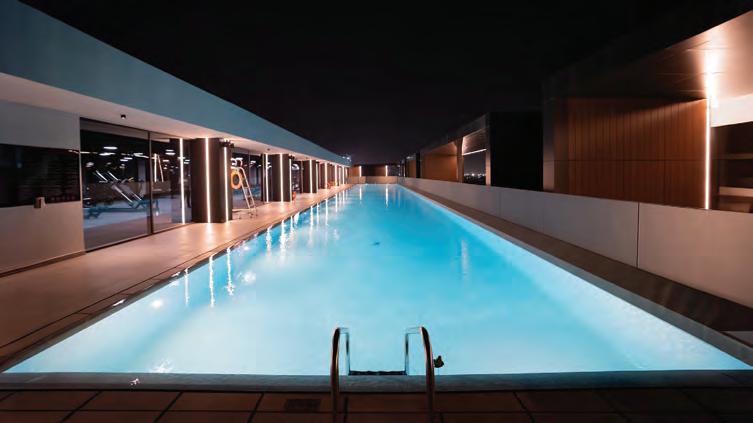
We’re also working to digitise the entire rental process and move away from physical contracts.
Everything is clearly communicated, with structured steps and written guidelines to ensure transparency. We roll out major changes gradually to avoid disrupting day-to-day operations, and we always make space for feedback. That open dialogue helps the team feel involved and respected. As a result, we face very little resistance, and when someone isn’t aligned with the direction, the next steps are usually straightforward and handled with mutual respect.
What do you believe Alphabeta Properties does better than anyone else in the region?
We focus on creating a product that genuinely reflects how people want to live today. What sets us apart is our commitment to thoughtful design, from the overall architecture down to the
layout and finishes.
We don’t follow trends for the sake of it; we build with purpose and detail, making sure every element adds value to the living experience. Our developments are built around the needs of a new generation - people who expect quality, functionality, and a sense of space. We believe luxury is about how a space feels, how it flows, and how well it supports day-to-day life.
That mindset carries through everything we do, from the materials we choose to how we interact with tenants. Tenant satisfaction is at the core of our work. It’s not a marketing line. It’s what drives our decisions and has been the biggest factor behind our reputation and growth in the market.
How are AI and digital transformation reshaping your industry? How are you and your team preparing for it, both in mindset and in skillset?
There’s always new technology being introduced, and we’re constantly testing what works best for our business. For example, we’ve implemented home automation systems and building management software that use machine learning to optimise utility savings.
We’re also working to digitise the entire rental process and move away from physical contracts. The goal is to simplify and improve the experience for both the business and the tenant.
In terms of customer experiences, what trends have surprised you in the last few years?
In my view, the most surprising trend has been the sheer number of apartments being sold, despite clear demand in the market for low-rise, villastyle units. Developers are focused on maximising GFA (gross floor area) on plot sales, but the real appetite seems to be for lower-density living, something that’s not being adequately addressed.
My concern is whether the market can absorb the volume of the new apartment supply. It feels like a large portion of that demand is coming from speculative investors rather than genuine end users, which could create challenges down the line.
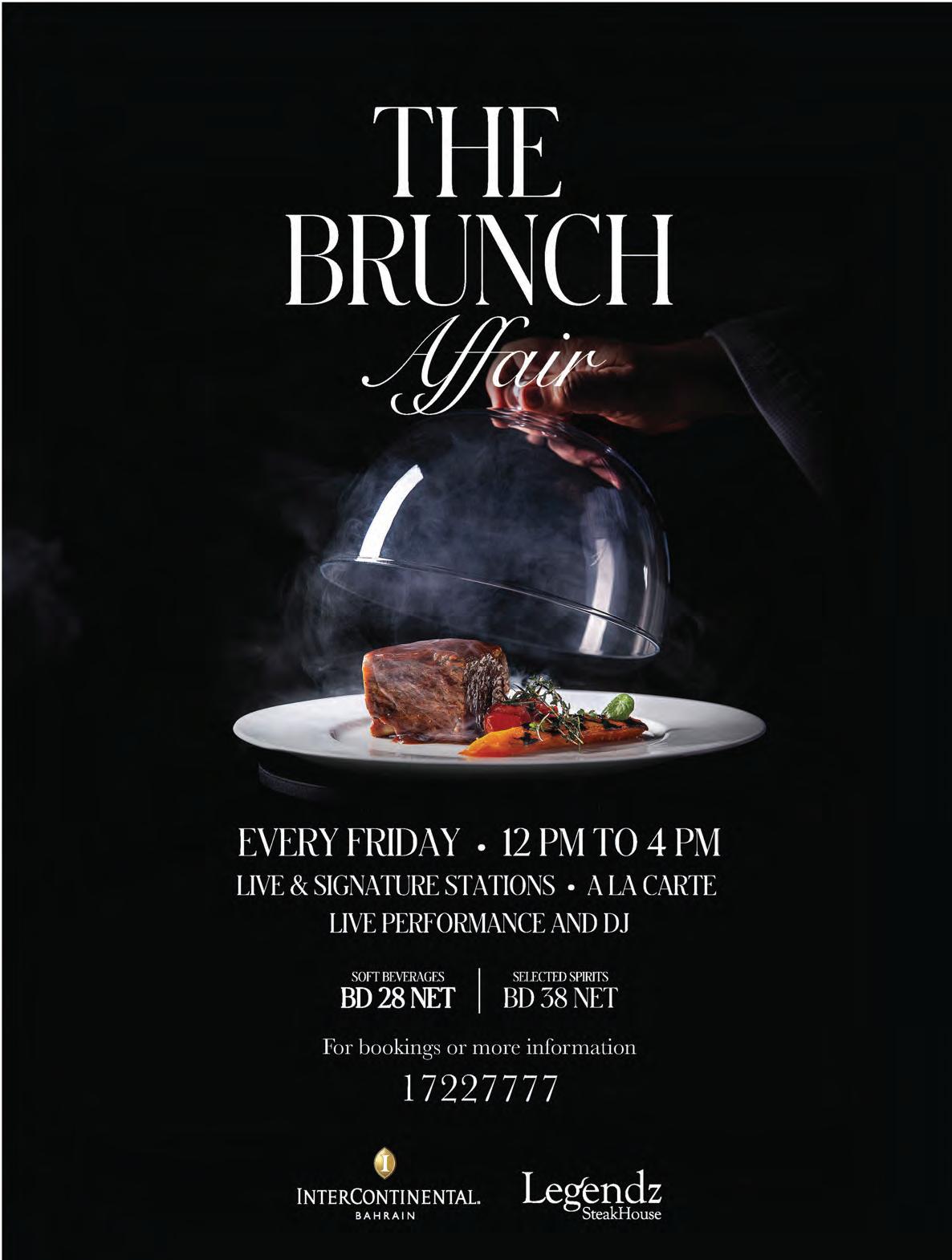
Yaser Alsharifi, Group Chief Executive of Bank of Bahrain and Kuwait, is leading it into the next phase with a strategy rooted in trust and technology. He highlights how BBK is expanding its reach, embracing digital change, and positioning itself as a future-ready force in Bahrain’s financial sector.
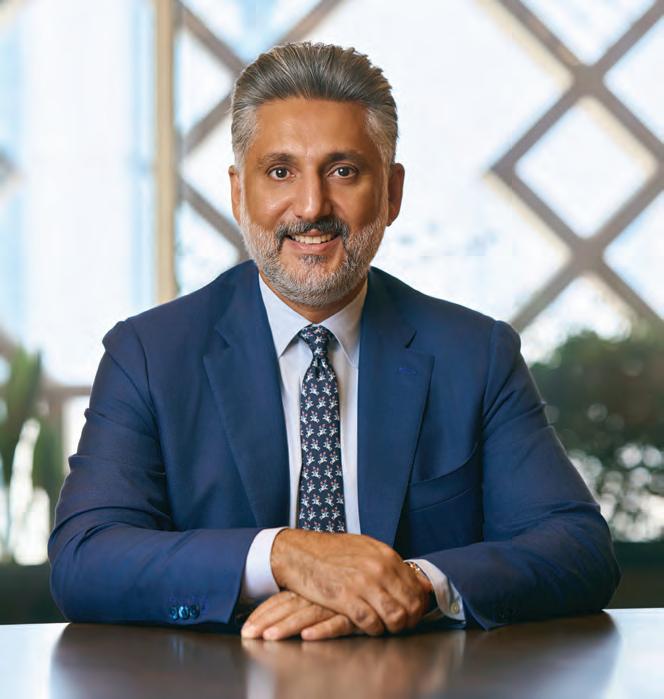
Since becoming BBK’s Group Chief Executive in 2024, what’s been your top priority for the bank?
People are my top priority - our employees and our customers. BBK is a strong, successful institution, and change can be challenging when things are going well. It was an
important exercise to identify what has worked for this bank that we can learn from and build on while also looking at what needs to be changed. I focused on understanding what drives our employees, identifying their pain points, and creating a workplace they can truly be proud of because change starts and ends with people. That
internal alignment lays the foundation for exceptional customer experiences and, ultimately, enduring value for our stakeholders.
What unique leadership challenges and opportunities come with heading a major bank in Bahrain’s evolving financial landscape?
BBK has traditionally promoted leaders from within, so joining as an external hire meant I had to earn trust quickly. I made it a priority to invest in relationships, formally and informally. Thankfully, the team was welcoming, and we hit the ground running. Their professionalism ensured the bank never missed a beat and they were able to continue to deliver while I worked in the background with them to prepare for the future. That consistency gave us a solid foundation to evolve and innovate without disrupting what already works well.
What, in your opinion, sets BBK apart from other banks?
BBK is deeply rooted in the local community, and this bond influences how we operate, both digitally and in our physical branches. We take pride in offering services that are friendly, reliable, and tailored. We are agile, we adapt quickly, respond to change, and work hard to earn and retain customer loyalty. Our core values - trust, discretion, and professionalism - are non-negotiable. These are not abstract ideals; they are evident in every interaction, especially as we welcome new clients transitioning from HSBC in the last quarter of the year.
What objectives drove BBK’s decision to acquire HSBC’s retail portfolio in Bahrain?
This was a strategic fit. BBK has long had deep roots in Bahrain, serving individuals, SMEs, large corporations, and government-related
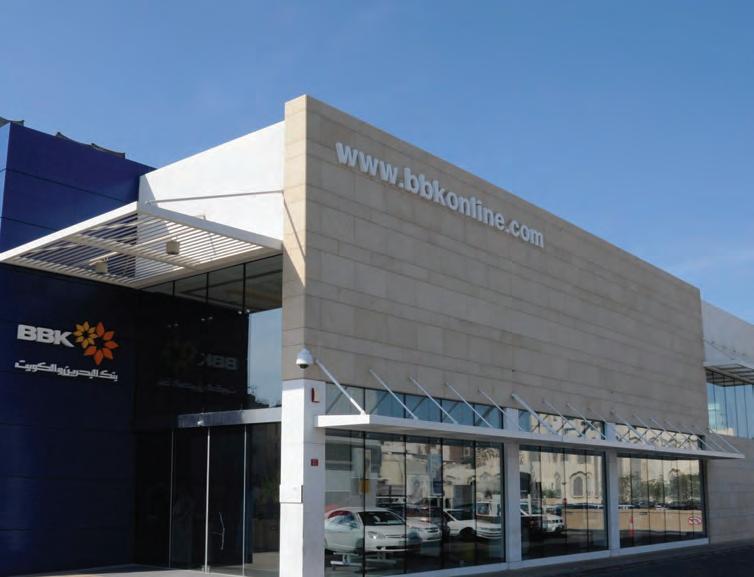
We are transforming our decision-making by using data and analytics to guide every move because, without measurement, there is no progress.
entities. But Bahrain isn’t just home to citizens, it’s a vibrant, diverse expat community as well. HSBC’s portfolio allowed us to strengthen our presence across both segments. We saw it as a natural extension of our mission: to serve the entire community with reliable, high-quality banking services.
What milestones is BBK on track to achieve in the next few years?
We are transforming our decisionmaking by using data and analytics to guide every move because, without measurement, there is no progress. To truly deliver on our people promise and customer-first mindset, we must be guided by discipline - anchored
in data, powered by technology. At BBK, innovation is not a buzzword; it’s a commitment. We strive to be the pace-setter in Bahrain’s banking landscape by offering quality, value, and security across every interaction. Our digital channels are becoming more intuitive, designed to deliver seamless, engaging experiences. We’re embracing embedded finance through meaningful partnerships and deploying AI to create personalised services that anticipate customer needs - while maintaining the highest standards of data privacy.
We recognise that value today goes beyond just money; it includes the data and trust our customers place in us. Our mission is to build a bank that not only meets expectations but exceeds them - intelligently, securely, and proactively.
How is BBK adapting to the pace of change in financial technology?
We focus on three core areas. First, we are exploring digital assets, an emerging space where we are working closely with regulators and partners to learn how to serve our customers safely.
Second, we are expanding embedded finance. This involves teaming up with fintech, telecom and retail companies to deliver seamless, intuitive services wherever customers are. To support this, we are investing in digital tools like API ready systems that make these partnerships effective.
Third, we see tremendous potential in AI. From enhancing customer support and boosting productivity to detecting fraud, AI enables us to serve more intelligently.
Our goal is to support customers throughout their financial journey, whether they are starting a savings account, buying a home or launching a business. We are also committed to helping SMEs thrive. They power the economy, and by equipping them with smarter tools for payroll, reconciliation and growth, we help turn their big ideas into lasting success.
Shaj Babu, CEO of Julius Baer Bahrain, reflects on the wealth management firm being on the cusp of marking 50 years of presence in the Kingdom. In this exclusive interview, we learn about how Julius Baer witnesses shifting client preferences as the younger generation looks to alternative forms of wealth management.
Bahrain has been a key part of Julius Baer’s regional story.
Can you walk us through the evolution of your presence in the country and what makes this market strategic for the bank?
Julius Baer’s expansion into Bahrain was initiated by the Group’s acquisition of Merrill Lynch’s International Wealth Management businesses in 2013. Since then, 95% of Merrill Lynch Bahrain’s clients moved to Julius Baer in recognition of our values, heritage, and innovation.
Next year, we will proudly celebrate 50 years of continuous presence in the Kingdom. This milestone not only showcases our long-term commitment to Bahrain but also reflects the deep trust we have built with clients in the region through our personalised advisory services.
Julius Baer has over 130 years of heritage in helping families manage and pass on wealth to the next generation. How does that legacy influence your approach to advising clients?
Julius Baer began as a familyowned business over 130 years ago and has since grown into a fully listed global entity. This history gives us a unique perspective on understanding the challenges families face when managing and preserving wealth across generations.
Our identity as a pure-play wealth
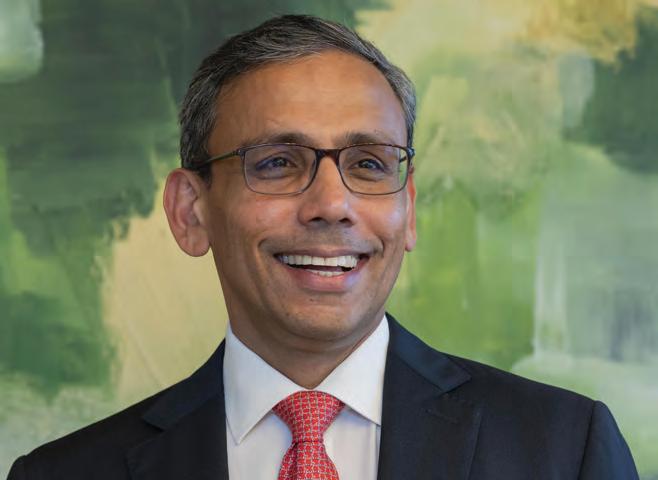
manager sets us apart. It allows us to focus exclusively on our clients’ best interests without the distractions of other business lines. In a region like the Middle East, where much of our clients’ wealth is often generational, and where financial legacy forms the lifeblood of both family and national economies, that focus matters more than ever.
Bahrain is a prime example. Our 50-year presence in the Kingdom is a testament to our commitment, consistency and ability to grow with our clients.
What investment trends do you see gaining momentum in Bahrain, and how do you evolve to stay relevant to the ever-changing needs of clients?
Clients in Bahrain are increasingly looking for long-term solutions to help them navigate the complexities of transferring wealth across generations.
Our role is to guide families through this journey, to help them secure a more stable and sustainable financial future through a smooth handover of their wealth to the next generation.
We also see strong interest from clients in the region for Shariah-
compliant products. At Julius Baer, we have enhanced our Islamic finance offering to include a range of 3rd party solutions, including Sukuks, Islamic funds and structured products, in addition to in-house products such as Commodity Murabaha Financing, to cater to their needs.
The next generation represents conscious consumers and responsible investors, prioritising impact and values in their decision-making. We are seeing a shift in their investment preferences,
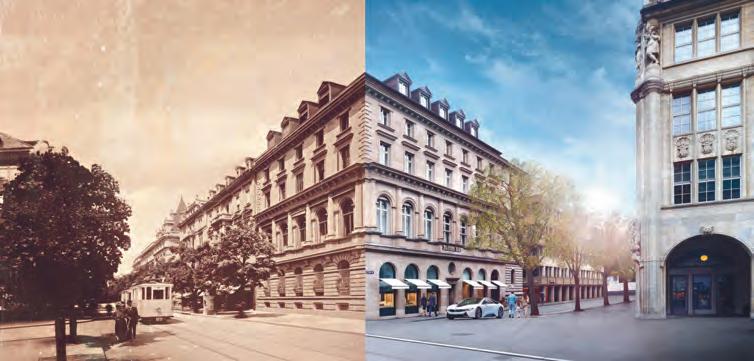
The next generation represents conscious consumers and responsible investors, prioritising impact and values in their decisionmaking.
with a rising interest in alternatives, digital assets, and thematic investment strategies to diversify their portfolios beyond traditional asset classes.
It is our responsibility to bridge this generational shift in mindset between current and future generations with the right guidance and education.
With AI and digital innovation reshaping wealth management, how is your team embracing change to stay ahead both in mindset and in expertise?
At Julius Baer, we believe that people remain at the heart of our business. Our clients value the trust, continuity, and personal connection we offer through personal advisory relationships. Technology does not replace that; it enhances it.
Tools like AI and digital innovation help us serve clients faster, more effectively, and in ways that are tailored to their evolving preferences. These tools empower our advisors, but personal connection and empathy
remain the core of what we do.
Our team leverages cuttingedge financial tools such as Julius Baer’s Digital Advisory Suite, which streamlines the investment process, and digital onboarding tools like video identification and e-signatures that make account opening seamless for clients.
Julius Baer’s legacy has been built on long-term focus and stability. What does this heritage mean to you personally, and how has it shaped your leadership style?
To me, focus means putting the client at the core of everything we do and never losing sight of that. Our values, our legacy and our drive towards innovation are all centred on one end goal, securing our clients’ financial futures and being their trusted partners across generations.
Being in Bahrain for the past 50 years has allowed us to leverage deep relationships and build enduring partnerships. Our team in Bahrain is fully aligned around this purpose: positioning Julius Baer as a trusted personal wealth advisor.
When you look at the next three years, what does success in Bahrain mean to you both personally and professionally?
While Bahrain is small in terms of market size, it has long served as a critical hub for business and financial services. That legacy remains strong today. In addition to serving clients locally, we extend our reach to clients domiciled in Saudi Arabia’s Eastern province, Jeddah and Riyadh.
Saudi Arabia, as we all know, is rapidly transforming into a new regional financial hub, and the opportunities it presents both in Bahrain and beyond are growing exponentially. So, success in Bahrain is not only defined by the opportunities presented in the country but also by business acquired beyond our borders.
Professionally, success means establishing a bond of trust, building a reputation that extends beyond transactions, and positioning myself, the team and Julius Baer to remain as the wealth manager of choice for our clients.
What began as a gesture of support became a transformative journey into leadership and success. In Bahrain, Remya Madan and her husband built Remya Management from the ground up, spanning hospitality and fitness, into a portfolio that now includes some of the island’s favourite lifestyle hubs.
What was the initial challenge or gap you aimed to address when starting this business?
Ten years ago, I stepped into the hospitality industry primarily to support my husband, Madan Perattur, in whatever capacity I could. At the time, I had no prior business experience, so I learned everything alongside him, taking it one step at a time. From the outset, our goal was to create a warm, inviting space where guests not only enjoy topnotch amenities but also feel genuinely cared for and connected to the locale.
I firmly believe that without strong teams working across every department, business success is unattainable. Madan has been exceptional at assembling a unified and skilled team, which we take great pride in. Our achievements are entirely rooted in the strength and cohesion of our team.
What milestones has the company reached over the past two years?
In the last two years, we have expanded our business footprint and launched new outlets that have been warmly embraced by the market.
Can you describe a particularly challenging moment for your company in recent years and how you and your team managed it?
The global pandemic hit the hospitality industry hard, forcing us to temporarily shut down operations and rethink our business model from the ground up. Throughout this
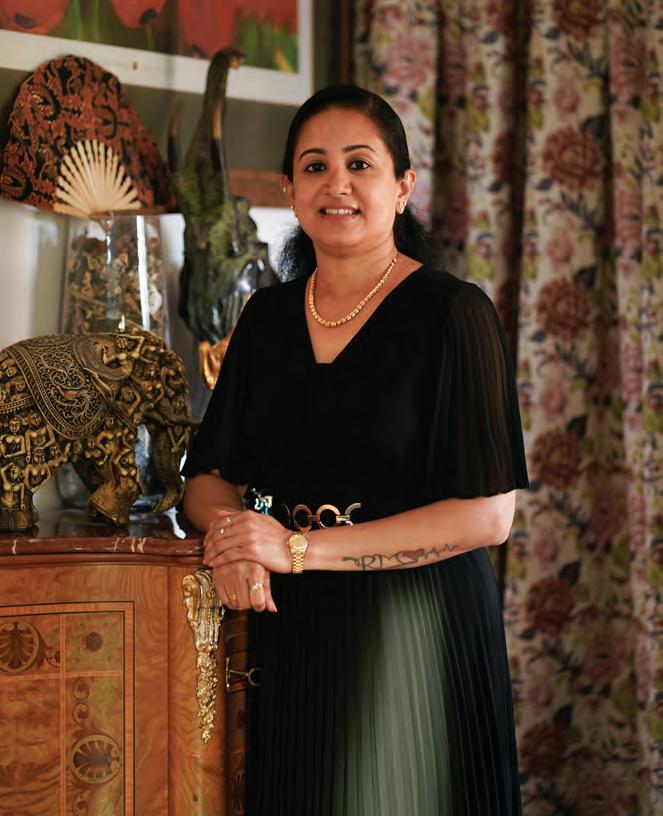
period, we maintained open and honest communication with our team, implemented rigorous health and safety measures, and diversified our services.
The resilience and adaptability of our team were crucial in overcoming this crisis and setting the stage for our recovery.
How do you handle resistance or pushback towards organisational changes you implement?
We recognise that change can be unsettling, especially in a service-oriented environment. To ease resistance, we focus on clear communication about why changes are necessary and the benefits they bring. We involve team members early on in the planning stages and ensure they receive proper training and support. By fostering open conversations, we
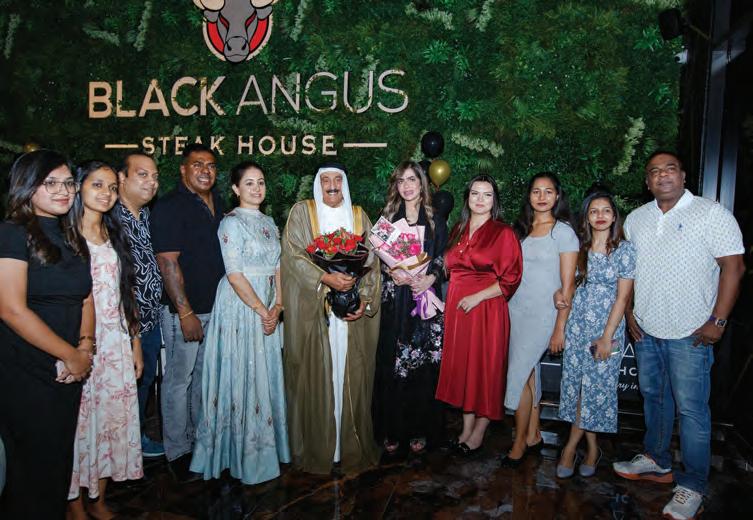
Our achievements are entirely rooted in the strength and cohesion of our team.
address concerns directly and welcome input, promoting a collaborative culture focused on ongoing improvement.
What do you believe sets your company apart from others in the region?
Our hallmark is delivering personalised guest experiences that blend exemplary service with authentic local connections. We have a knack for anticipating guest needs and crafting memorable moments that surpass typical hospitality standards. Additionally, our dedication to sustainability and community engagement sets us apart and resonates strongly with today’s mindful travellers.
How are AI and digital transformation influencing your industry, and how are you preparing your team mentally and skill-wise?
AI and digital innovation are transforming hospitality by enabling smarter resource allocation, predictive insights into guest preferences, and enhanced communication tools. We are investing in technology platforms that enable personalised marketing, dynamic pricing, and improved operational efficiency. Our team is encouraged to embrace a mindset of lifelong learning, supported by training programmes emphasising digital proficiency and data literacy to maintain our competitive edge and deliver innovative guest experiences.
Regarding customer experiences, what trends have caught you by surprise in recent years?
The swift shift to contactless menus, mobile ordering, and digital payments has fundamentally changed how guests interact with restaurants. What started as a necessity has rapidly become an expected standard for convenience and safety.
How do you manage stress as well as balance personal and professional responsibilities as a business leader?
Starting my day with a tough workout sets the tone. It gives me energy throughout the day. We manage two fitness facilities: Madan Fitness and Madan CrossFit. Each day, I dedicate an hour to CrossFit training, which contributes to keeping my stress levels low and maintaining my health and fitness.
My husband and children are incredibly supportive and understanding, and I must say, my kids are exceptionally independent. It is precisely because of this support that I am here today. Most importantly, I remind myself that success isn’t just about business growth, it’s also about the quality of life I’m creating for myself and my loved ones. That perspective helps guide my decisions and keep things in balance.
Ahlam Oun, Director and Global Leader at General Assembly Middle East, tells us how the institute is reshaping education, championing local talent, and preparing the workforce for a rapidly evolving tech future. From co-creating curricula with leading companies to building confident hires, this interview dives into the heart of an upskilling revolution in Bahrain.
What was the original idea behind launching General Assembly in Bahrain?
When we launched General Assembly Bahrain, the mission was never to replace traditional education - it was to complement it. We work alongside universities and institutions to build on strong academic foundations, bridging the gap between formal education and the rapidly evolving needs of today’s job market. Our focus is twofold: elevating technical skills in high-demand fields like tech, data, and design, and evoking internal transformation through structured career coaching. Thriving in today’s world isn’t just about mastering tools - it’s about building confidence, clarity, and the mindset to lead.
That’s why our commitment goes beyond the classroom. We extend outcomes and career support for up to nine months after graduation, understanding that navigating the job market and venturing into the future takes more than just skills - it takes mentorship, direction, and a community that walks with you. At the heart of it all is our belief in the power of Bahraini talent - to become the confident, capable, and preferred choice for employers both locally and across the region, all while advancing Bahrain’s broader vision of a future-ready, diversified economy.

What milestones has General Assembly Bahrain achieved in the last few years?
2025 marks our third year in Bahrain, and what a journey it’s been. In just the past two years, we’ve trained and graduated over 1,500 learners through our full-time, part-time, and accelerator programmes in UX Design, Software Engineering, Data Analytics, and Career Development. Behind every number is a story of resilience, ambition, and transformation.
We’ve built strong partnerships with universities, banks, institutions, and
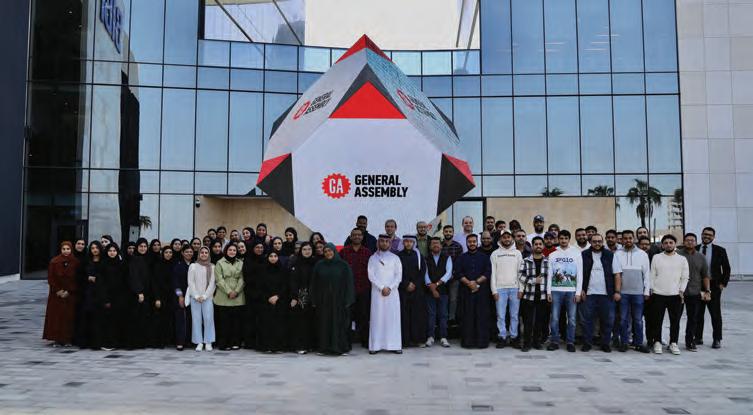
We’ve built strong partnerships with universities, banks, institutions, and employers who share our belief in the power of upskilling
employers who share our belief in the power of upskilling. From launching employer-sponsored accelerators to hosting four major tech career fairs, we’ve actively connected our talent with real-world opportunities.
Over 80% of our graduates have been enabled in roles across full-time jobs (70% of them), part-time positions, internships, and one-year training programmes. What we’re especially proud of: 35% of them came from non-tech backgrounds and successfully shifted careers through our bootcamps, proving what’s possible with the right support. Through workshops, speaker sessions, and industry collaborations, we continue to embed ourselves deeply in Bahrain’s tech ecosystem. And this is still just the beginning.
Can you recall a particularly difficult moment for the institute over the last few years? How did you and your team deal with it?
One of the most challenging yet defining moments for us has been navigating the space between talent and industry - catering to both, while elevating expectations on both sides. We’ve always operated as double agents, speaking two very different languages. One is the language of dreams: individuals, often from nontech backgrounds, looking to break into a field they never thought possible. The other is the language of needs: organisations, local and global, seeking top-tier tech talent that delivers from day one.
Speaking both languages, was never simple. Despite the challenge, it led to some of our proudest breakthroughs. We’ve seen companies take a chance on potential, not just pedigree. We’ve witnessed Bahrainis rise - some with completely different experiences than what they aspired to - proving that grit, determination, and the right training can bridge even the widest experience gap. What felt like a difficult balancing act at first has become our edge - and our purpose.
How do you navigate pushback or resistance to organisational changes you implement?
Resistance is just another form of feedback - it’s information. We don’t push change for the sake of it; we take the time to explain why it’s needed, and we make space to listen. Most of the time, resistance isn’t about the change itself - it’s about how it’s introduced, or fears around what it might mean.
That’s why, when we set out to revamp our Java training and elevate tech talent in that space, we didn’t do it in isolation. We went straight to the source - top-tier companies - and asked them exactly what they were looking for. Then we brought them in to cocreate the curriculum with us, making sure it wasn’t just aligned with market demand, but directly shaped by it. Change only works when people can see themselves in the outcome.

Change only works when people can see themselves in the outcome.
More often than not, what starts as resistance turns into alignment because people don’t resist progress, they resist not being part of it.
What do you believe General Assembly does better than anyone else in the region?
At General Assembly Bahrain, we don’t just build talent, we build belief and pipelines for the future. We understand where the market is heading, how economies are shifting, and what industries need, not just today, but tomorrow. That’s why we’ve become a trusted pillar for governments, international institutions, and companies looking to future-proof their workforce with real, ready, and resilient tech talent.
We see people beyond their CVs, beyond their current roles or past experiences. We see what they’re capable of becoming. That belief is embedded in everything we do. We don’t just train, we co-create with employers, we coach with
intention, and we stay in it with our graduates long after they complete the programme. We’ve made outcomes - not enrolments - our measure of success. We’ve bridged the gap between ambition and industry and turned career shifters into confident hires. It’s not transactional. It’s not surface-level. It’s deep, personal, and transforming the region’s tech workforce - one life, one role, and one future at a time.
How are Al and digital transformation reshaping your industry? How are you and your team preparing for it, both in mindset and in skillset?
AI isn’t on its way - it’s already here and it’s reshaping how we think, work, lead, and grow. That’s why we built General Assembly’s AI for All Academy - a first-of-its-kind offering in the region designed to close the AI skills gap and prepare every role, at every level, to thrive in an AI-powered world. We didn’t build a one-size-fitsall programme; we built an entire ecosystem. One that speaks the language of leaders making strategic decisions, data teams building infrastructure, and business professionals driving daily operations. Our programmes are role-specific, expert-led, hands-on, and customisable, with real use cases tied to your industry
and workflows.
From half-day sessions to deep-dive accelerators, we take teams from AI-enabled, to AI-augmented, to AIsuperpowered and we do it in a way that delivers true Return on Learning. This isn’t about tech for tech’s sake. It’s about preparing your people, transforming your business, and staying competitive in a world that’s moving fast. Governments and global companies have already trusted us to upskill their teams.
In terms of learner experiences, what trends have surprised you in the last few years?
One of the most notable shifts we’ve seen is that learners are no longer just coming to us for skills - they’re seeking clarity, direction, and a sense of reinvention. Today’s talent is highly intentional. They want programmes that align with their pace, lifestyle, and aspirations - whether that’s through flexible formats, micro-certifications, or hands-on, real-world projects.
What’s been most striking, though, is the growing importance of belonging. When learners feel genuinely seen, supported, and part of a community, the transformation goes far beyond technical skills - it becomes personal, lasting, and deeply impactful.

Bader Sater, CEO of Bahrain FinTech Bay, is convinced that talent is the key to unlocking the region’s next wave of digital growth. In this interview, Sater talks to us about the MENA Innovation Academy, an initiative that, along with a host of other strategies, is cultivating future-ready leaders equipped to shape the fintech landscape from the ground up.
What inspired the creation of the MENA Innovation Academy, and why now?
The MENA Innovation Academy was born out of a need we could not ignore. As the region accelerates its digital transformation, we saw a clear gap in access to worldclass, practical fintech and innovation education tailored to our context.
Governments are investing heavily in digital infrastructure, regulators are adapting at pace, and private sector players are on the run to stay competitive. But there has been a missing link: the talent that bridges vision with execution.
That’s where the MENA Innovation Academy comes into play. The academy is an initiative powered by Bahrain FinTech Bay in partnership with Reboot 01. Our goal is to cultivate the next wave of fintech talent, upskill our region’s professionals not just with theory, but with global-calibre, hands-on learning that is aligned with the MENA region’s economic goals.
We partner with world-renowned universities such as Georgetown University, UC Berkeley, etc, to provide participants with quality education that can help them lead transformation within their sectors, and equip the ecosystem to scale in a way that is sustainable and regionally grounded.
What kind of learner or professional will benefit most from the Academy’s offerings?
The MENA Innovation Academy’s courses target decision-makers, rising

leaders, and technical professionals who are actively navigating change and need to stay ahead of it. These are people who are already making
and innovation strategy. What sets us apart is that we understand the cultural and regulatory context of the MENA region, and we have built a learning

The MENA Innovation Academy’s courses target decision-makers, rising leaders, and technical professionals who are actively navigating change and need to stay ahead of it.
an impact, but want to deepen their expertise and align with international standards. The structure of our programs is modular, high-level, and in partnership with some of the leading global organisations and universities to ensure high-quality quality effective training and education.
What makes this Academy’s approach to ‘career readiness’ different from the rest?
We are not offering generic certificates or passive learning. The Academy is outcome-driven; every course is developed through a unique collaboration between top-tier institutions and industry stakeholders here in the region.
That means our learners gain insights that are academically sound but also grounded in real-world challenges, particularly in fintech, AI, cybersecurity,
model that keeps that in consideration.
How does Bahrain FinTech Bay see its role in shaping the region’s innovation ecosystem through initiatives like MIA?
BFB has always operated with a broader vision in mind; we are here as an ecosystem builder. Bringing the full spectrum of market participants together. With initiatives like the MENA Innovation Academy, which is an initiative between Bahrain Fintech Bay and Reboot Coding Institute, this allows us to address a long-standing gap in high-level upskilling and position Bahrain as a regional anchor for fintech and tech-forward learning.
By partnering with organisations, universities, and private sector players, we are creating a pipeline of futureready leaders who understand both global dynamics and regional intricacies.

Looking back, what foundational strategies or decisions helped position BFB as a fintech hub for the region?
From the very beginning, we anchored BFB in three main roles: agility, collaboration, and credibility. We were interested in building deep partnerships with our regulator, the Central Bank of Bahrain, working closely with the Economic Development Board (EDB), and supporting other financial institutions in Bahrain.
This approach allowed us to align with government priorities and created open channels for global and local fintechs to co-exist and attract foreign direct investment in Bahrain. We focused on building trust and delivering impact through partnerships and acceleration programs, education and
training, research, and comprehensive ecosystem support. That long game is what positioned BFB as a leading fintech hub in the region.
As a leader in a fast-moving industry, how do you navigate uncertainty and stay ahead of change?
The pace of change in fintech and innovation is continuous, so what we focus on is creating a culture that adapts quickly to these changes. I personally rely on three things: staying deeply connected to the ecosystem, seeking diverse perspectives, and always planning for the long term while being agile in the short term. I don’t believe in reacting but rather being ready and proactive. This kind of mindset helps us absorb change and
not be disrupted by it.
What are your hopes for Bahrain’s role in the global fintech landscape over the next 5 years?
Bahrain has already proven that geographical size does not limit ambition. In the next five years, I see Bahrain doubling down on its role in the fintech space, a place where we continue progressing in regulations, attracting foreign direct investments, and nurturing talent.
I can also see more strategic crossborder partnerships come into place. We are uniquely positioned through our strategic location, which makes us a gateway to the GCC with a pro-business ecosystem and strong regulatory infrastructure.
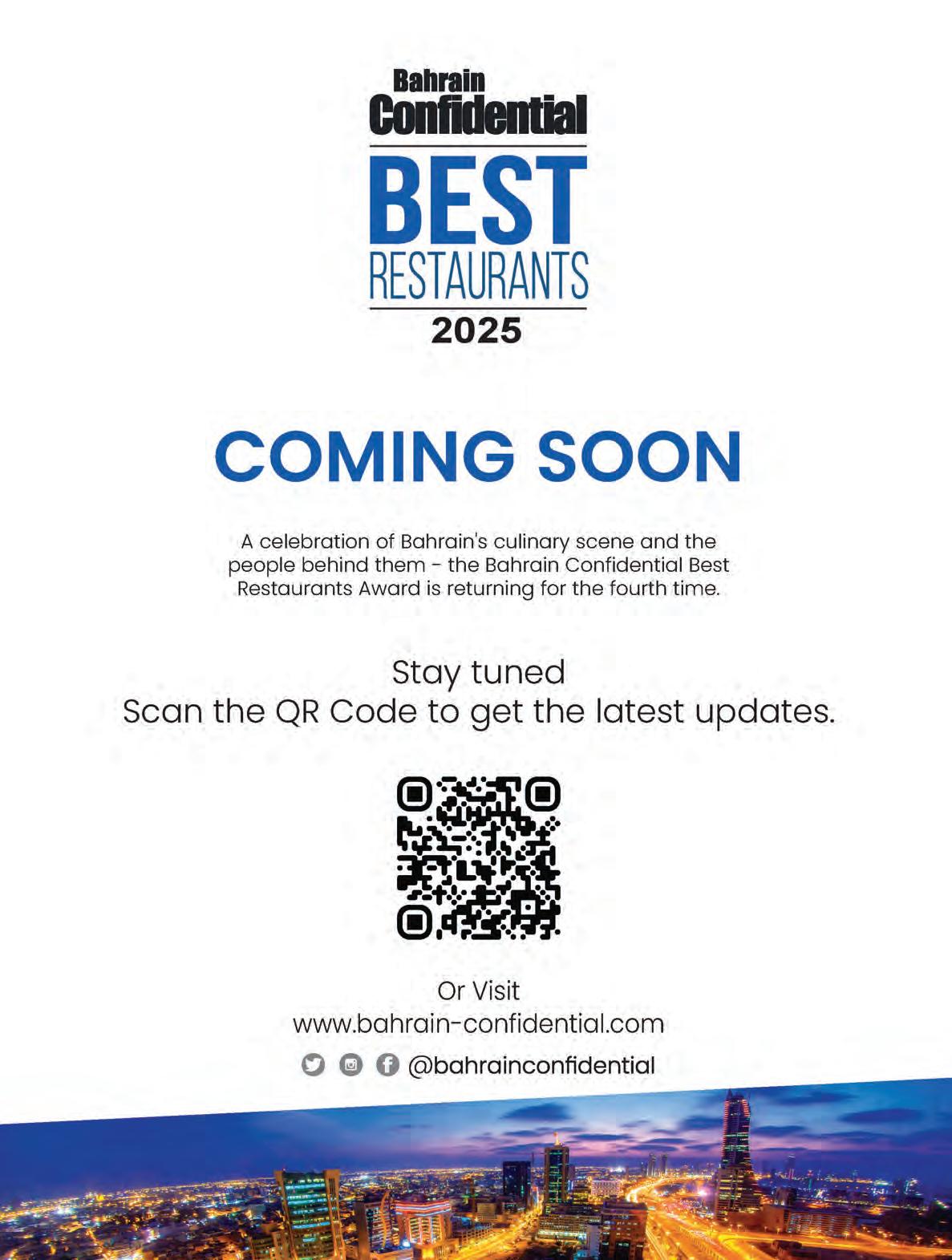
From boardroom meetings and strategy building to beachfront vows, The RitzCarlton, Bahrain makes a strong case why a hotel can, and should, be more than just a place to stay.
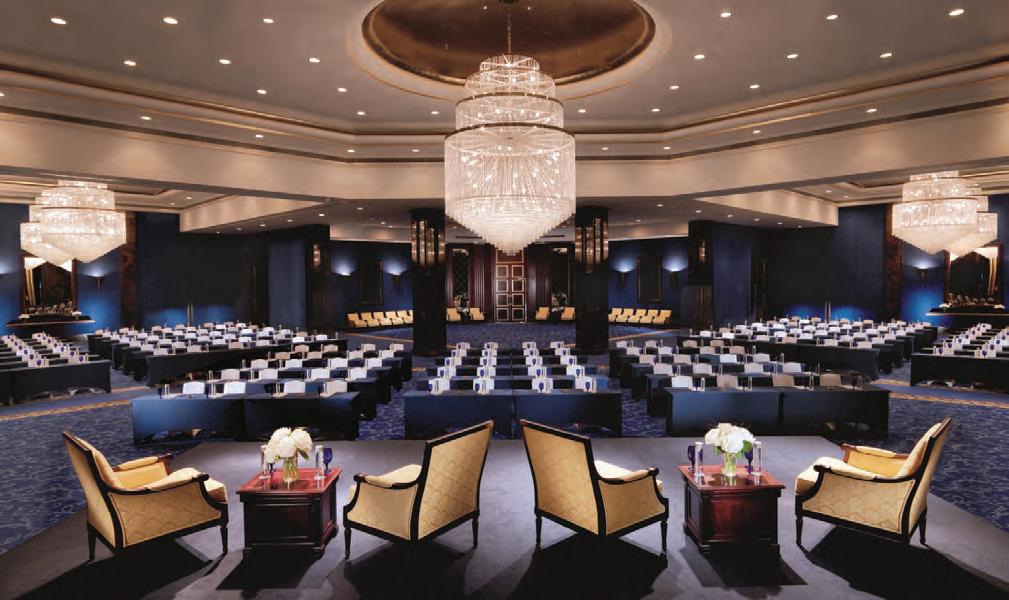
Tucked along the coastline in Manama’s Seef district, this renowned property has become a go-to for more reasons than its unmissable staycations and fine dining. The Ritz-Carlton, Bahrain opens its doors for people wanting to gather with purpose - whether to strategise and set business targets, team-build meaningfully, celebrate milestones, or simply connect.
A change of scenery inspires deeper thought.
Corporate events here don’t feel like a rerun of last quarter’s calendar. The numbers are impressive: 13 event rooms, over 3,700 square metres of event space, two expansive ballrooms, six breakout rooms, and a private island. However, what stands out more is how the hotel lets businesses break out of the usual format.
Board meetings are conducted in waterfront villas, where terrace tables and ocean views replace air-conditioned anonymity. Smaller groups can host brainstorming sessions on private lawns.
For something more dynamic, there’s
space for team-building activities on the sand or even the island just offshore. The logistics - from high-speed internet to lunch breaks - are taken care of.
Not every couple wants the same wedding, and that’s the starting point at the Hotel. Some go for a full-scale ballroom reception; others prefer something quieter - a dinner by the water, a villa gathering with close family, or vows exchanged on the beach.
The hotel’s approach is flexible. Wedding packages are tiered by size,
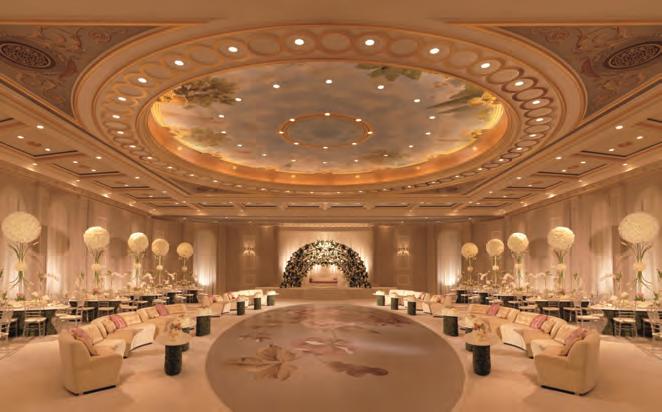
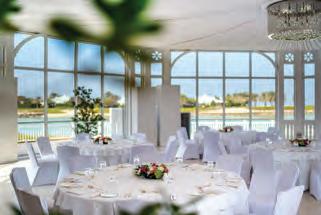

“Whether it’s a seaside ceremony or a high-level congress, we ensure seamless execution and peace of mind from start to finish.”
with optional extras like catering, spa treatments, and a suite for the couple. The culinary team can serve anything from traditional Bahraini dishes to international menus.
There’s also the option to take it all offsite - whether that’s a private home, palace, or tucked-away garden.
Anniversaries, birthdays, reunions, even corporate dinners - this is where the hotel’s villa setup really shines. Each villa, sitting along the edge of the resort, comes with its own indoor and outdoor space, and a bit of breathing room from the next. For events under 30 guests, it’s a solid alternative to a ballroom.
Live cooking stations can be arranged. Think shawarma, crepes, or a chocolate fountain - whatever suits the tone of the gathering. There’s space for seated lunches, cocktail-style parties, or even casual team huddles with sea views.
Also worth noting: the hotel’s catering team often works offsite too. They’ve done events in forts, deserts, private homes, and beyond. The team is used to adapting - and it shows.
Behind the scenes, there’s a deep awareness that hosting events shouldn’t come at the cost
of the planet. The hotel has its own environmental action team (REACT), which focuses on reducing waste, energy use, and sourcing food locally.
Linen reuse, paperless billing, and eco-friendly cleaning products are already in place, and the staff often get involved in community sustainability projects like native planting or garden initiatives.
Michael Mounir, The Ritz-Carlton, Bahrain’s Director of Sales and Distribution, puts it simply:
“At The Ritz-Carlton, Bahrain, the focus is not only on hosting events and meetings, but on crafting timeless experiences. Every gathering is elevated by the impeccable service of the Ladies and Gentlemen, whose passion for excellence is matched by meticulous attention to detail.
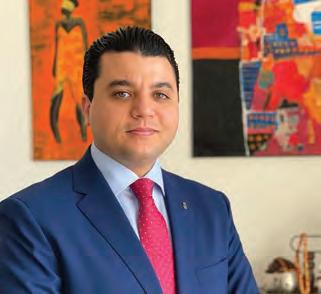
Whether it’s a seaside ceremony or a high-level congress, we ensure seamless execution and peace of mind from start to finish. With curated menus and personalised planning that reflect each host’s vision, the goal is to create moments that linger in memory long after the final toast. After all, it’s all about enjoying The Ritz-Carlton experience.”
The Ritz-Carlton, Bahrain is located in Bahrain’s Seef district.To find out more about the Hotel’s events spaces, contact +97317580000
The Global HSE 2025 Conference united leaders to drive impactful dialogues on innovation, safety, and sustainability across industries.

The 9th Edition of the Global HSE Conference & Exhibition, held in May 2025, emerged as the leading platform for advancing health, safety, and environmental (HSE) excellence.
H.E. Dr Mohamed bin Mubarak Bin Daina, Minister of Oil and Environment and Special Envoy for Climate Affairs, opened the global event while recalling
a recent tragedy at Bapco Energies, which claimed three lives. “No matter how much we progress, safety must always come first,” the minister said.
The conference, hosted by the Ministry of Oil and Environment in partnership with Aramco, brought together global industry leaders, policymakers, and HSE professionals for high-impact discussions, innovation showcases, and collaborations under
the theme “Connecting Minds, Inspiring Transformation.”
The technical programme, aimed at shaping the future of workplace safety, workforce well-being, and environmental sustainability, featured keynote speeches from industry pioneers, strategic panels, and expertled technical sessions. An exhibition highlighted the latest in HSE solutions, with key topics such as AI-driven
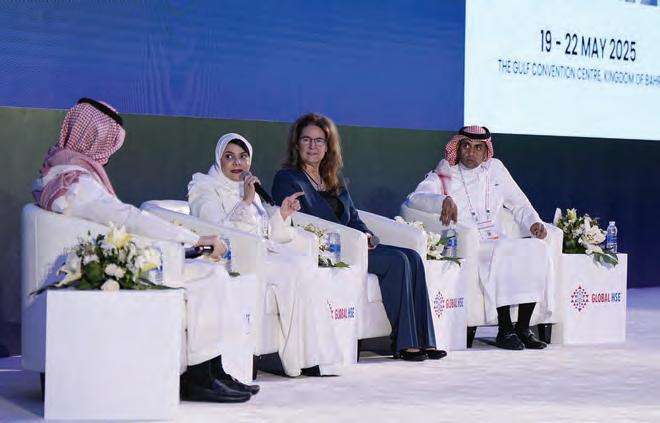

HSE intelligence, behavioural safety leadership, crisis preparedness, and sustainability-driven risk management taking centre stage, offering critical insights into navigating today’s evolving global challenges.
Specialised forums on Public Health & Safety, Construction HSE, and Youth Engagement encouraged cross-sector dialogue and knowledge sharing. A landmark gathering for decisionmakers and innovators, Global HSE 2025 proved to be a vital opportunity for organisations to demonstrate leadership, inspire transformation, and reaffirm their commitment to global HSE excellence.
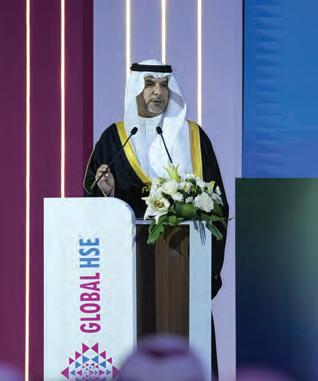

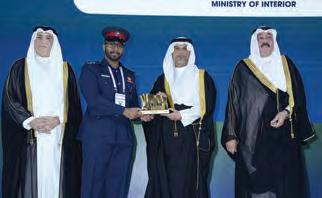

The British School of Bahrain, celebrating its 30th anniversary, has announced an ambitious new campus for its senior school students
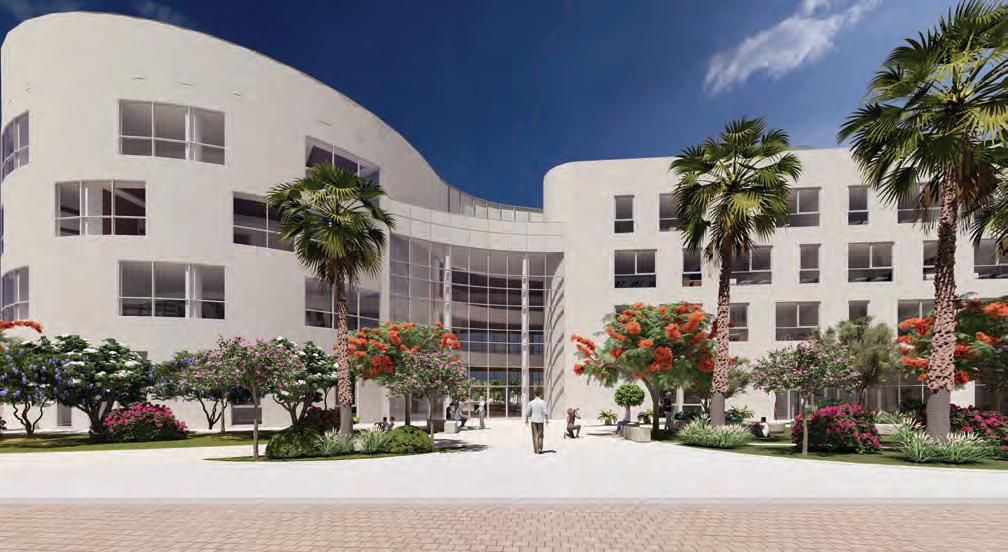
The British School of Bahrain (BSB) has unveiled plans for a new, purposebuilt Senior School campus, slated to open in the 2026/2027 academic year. Located near the current site and adjacent to Al Liwan Commercial Centre, the project marks a significant expansion for one of Bahrain’s leading educational institutions.
The launch comes as the school celebrates 30 years of delivering premium British education in Bahrain. In collaboration with Global Education consultants and leading architectural firm MSCEB, the campus has been designed to educate students from Year 10 through to Year 13.
This next-generation facility
will feature thoughtfully designed classrooms to support a range of learning styles, purpose-built study areas for independent and collaborative learning, and cutting-edge technology including the integration of Inspired AI, Inspired Education’s pioneering artificial intelligence platform to boost learning outcomes.
Students will also benefit from exceptional extra-curricular and performance facilities, including a FIFA-standard football pitch, athletics track, multi-purpose sports hall, an 8-lane indoor swimming pool, and an acoustically engineered 800 sqm auditorium with seating for an audience of over 500.
Nadim
M. Nsouli, Founder, Chairman & CEO of Inspired Education,
commented: “The new BSB campus aligns with Inspired’s vision of providing its students with a premium education in state-of-the-art facilities demonstrating our commitment to excellence in academics, sports and the creative and performing arts.”
“This is more than a new building. It is a meaningful investment in the future of our students,” said Executive
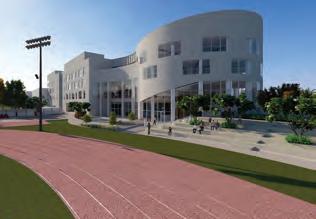

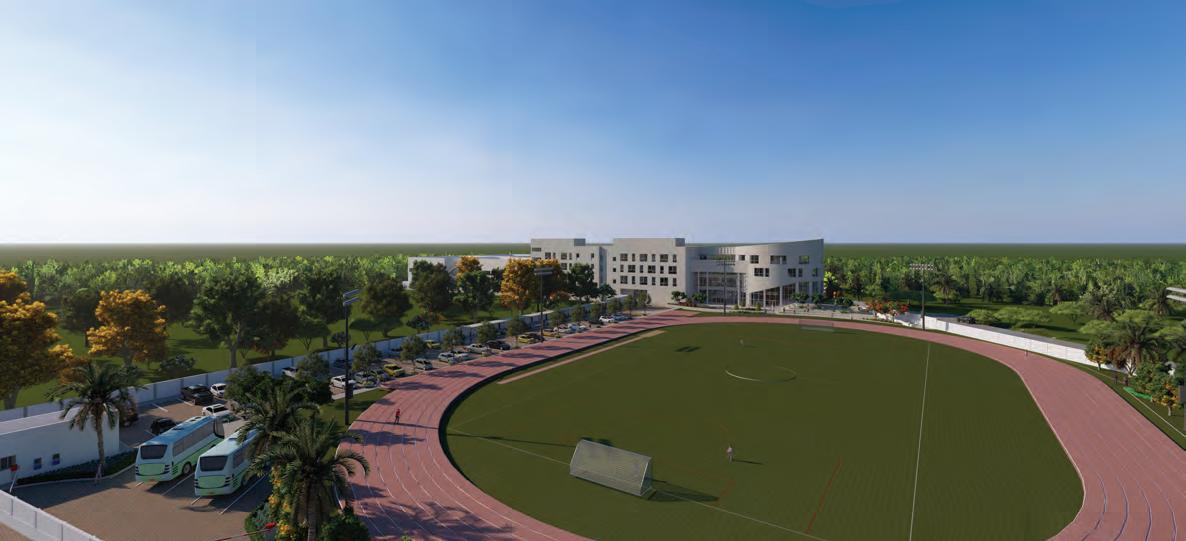
Headteacher Liz Stanley. “As we celebrate three decades of shaping young minds, this next chapter enables us to reimagine what senior education can be. We are creating an environment that inspires ambition, encourages independence, and equips every student to thrive in an ever-changing world.”
With the relocation of Years 10–13 to the new Senior School, the original campus will become a dedicated centre for students from Nursery through to Year 9.
This transformation allows BSB to reimagine its original campus into a vast, state-of-the-art learning environment tailored specifically for younger students, with age-appropriate innovation, care, and creativity at its heart.
This will create one of the most advanced Junior and Middle School campuses in the country, a nurturing and inspiring environment where children can develop curiosity, confidence, and a lifelong love of learning.

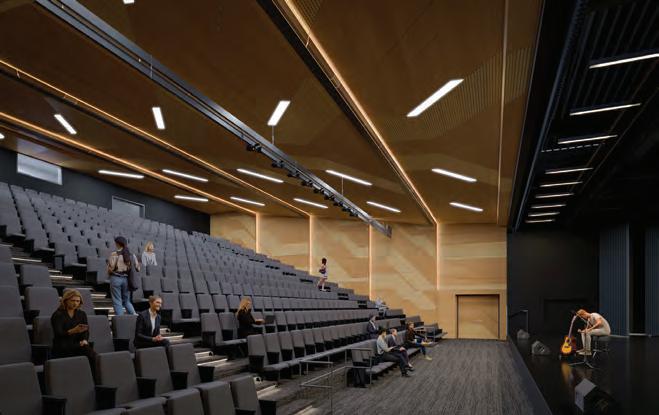

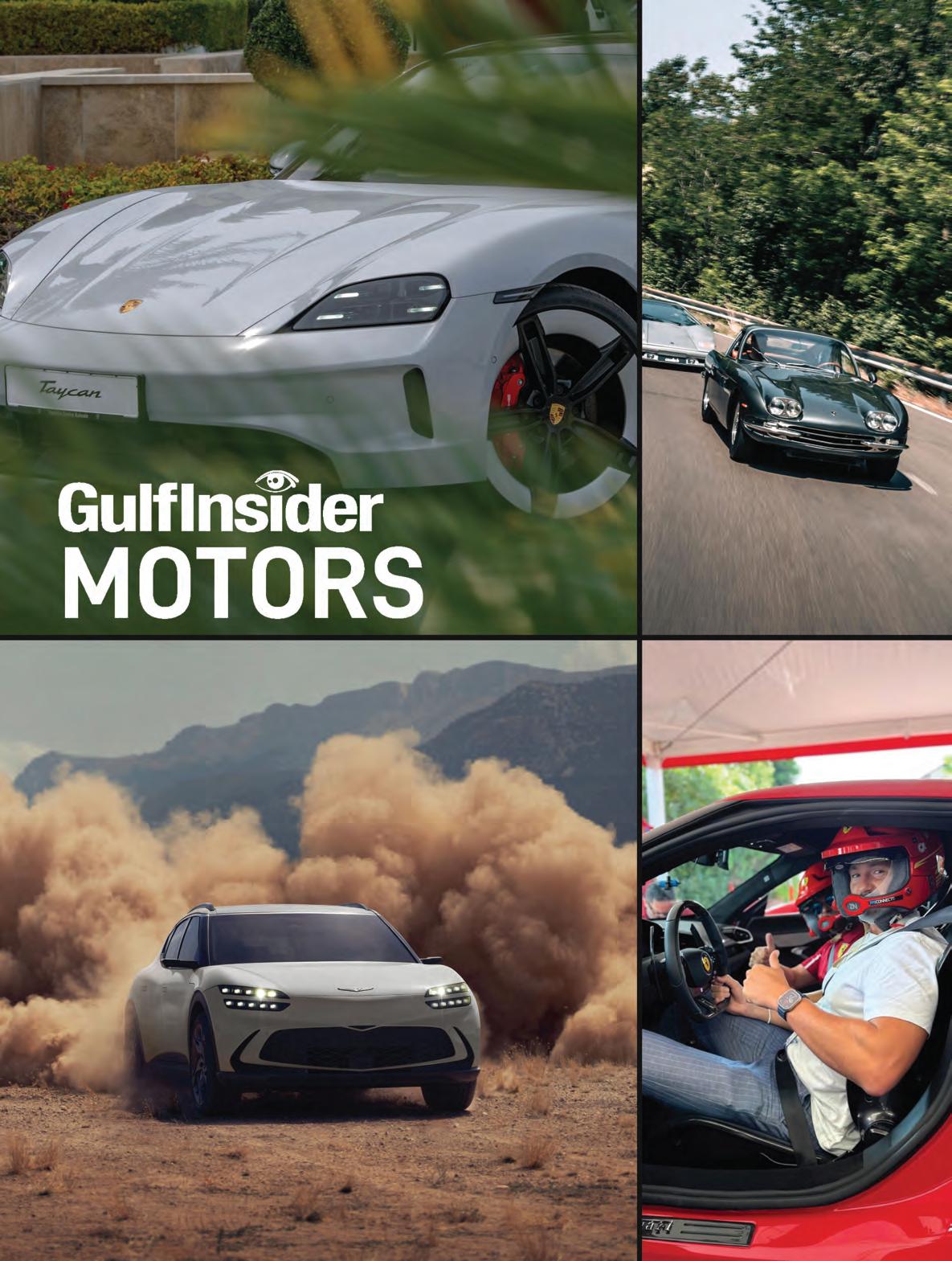
Genesis Bahrain’s rise from just 28 cars to being a market leader in the luxury automotive scene is a study in earning trust by redefining the rules of success. Celebrating 10 years in Bahrain, we reflect on a remarkable story that propelled a new, fledgling brand in uncharted waters, to the very top.

When Genesis entered Bahrain’s automotive market in 2015, few could have predicted the impact it would make. Launched as Hyundai Motor Group’s luxury division, the brand began with just 28 units sold in its first year - a modest figure in a segment long dominated by European brands. Although, it didn’t take long for Genesis Bahrain to go from newcomer to market leader, rewriting the rules of what it means to succeed in a highly
competitive, brand-loyal space.
Entering Bahrain’s crowded luxury segment in 2015 was no small feat. For any new brand, let alone one from a relatively young automotive lineage, the odds were stacked high. The luxury market was already saturated with names that had built their prestige over generations. To many, the risk of introducing a fresh face seemed impractical in a small but discerning market.
In both 2023 and 2024, Bahrain recorded the highest market share for Genesis anywhere in the MENA region.
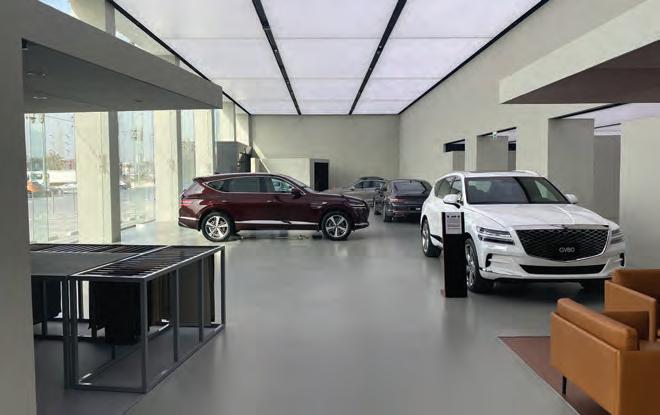
But Genesis dared to step in with clarity and confidence. Its early focus was not on volume but on carving out a distinct identity, one rooted in refined design, thoughtful innovation, and a customer-first approach. The groundwork laid during those early years would prove essential in the decade that followed.
By the end of 2024, Genesis Bahrain had recorded a growth of more than 15 times its initial annual sales volume. This wasn’t a sudden leap but a steady and impressive climb, year after year. The figures tell a story of a brand that has won over its customers, not just with its vehicles, but with everything that surrounds them - from attentive service and aftercare to a dealership experience that mirrors the quality of the product.
This kind of growth, particularly in the luxury segment, is rare. It speaks to three traits of a brand that’s here to stay: growing customer confidence, reliable after-sales support, and a brand strategy that has remained focused and consistent.
The rise of Genesis in Bahrain is part of a larger, almost incredible global story. In the last twenty years, the luxury automotive landscape has
remained firmly in the grip of heritage brands. Launching a new marque in this segment, and having it thrive, isn’t a common story.
Genesis challenged the norm. Globally recognised for design excellence, safety leadership, and customer satisfaction, it has garnered accolades from the Red Dot and Good Design Awards to top safety picks from the IIHS. Its commitment to innovation continues with the expansion of electric models like the GV60 and Electrified G80, positioning the brand for a futureoriented market.
In 2025, Genesis celebrates ten years in Bahrain, a milestone that marks not just the passage of time but a story of resilience and evolution.
What makes the Genesis Bahrain story particularly remarkable is how strongly it has resonated with local
customers. In both 2023 and 2024, Bahrain recorded the highest market share for Genesis anywhere in the MENA region. It’s an extraordinary achievement that reflects not just the quality of the product, but the precision of its local strategy.
Genesis Bahrain’s success has come from understanding what customers in the Kingdom truly value: personalised service, reliable excellence, and a brand that respects their expectations. Through curated experiences, consistent quality, and an unrelenting focus on customer care, Genesis Bahrain has built a relationship of trust and loyalty.
In 2025, Genesis celebrates ten years in Bahrain, a milestone that marks not just the passage of time but a story of resilience and evolution. From 28 units to a market-leading presence, Genesis has proved that new beginnings can, with the right values and vision, rise to become trusted legacies.
For customers in Bahrain, this 10-year journey is also a reflection of their belief in something new, their willingness to explore beyond the familiar, and their role in helping shape the success of a brand that now feels very much at home in the Kingdom.
As Genesis looks ahead, the promise remains unchanged: to keep delivering exceptional products, raise the bar for service, and evolve with the times, all while staying rooted in the values that made its journey possible.

A Porsche made to reflect your personality, your preferences, and your lifestyle is a Porsche worth keeping in your driveway. That’s exactly what Exclusive Manufaktur offers, a bespoke customisation programme by the iconic automotive brand that blends your imagination with Porsche’s innovation.
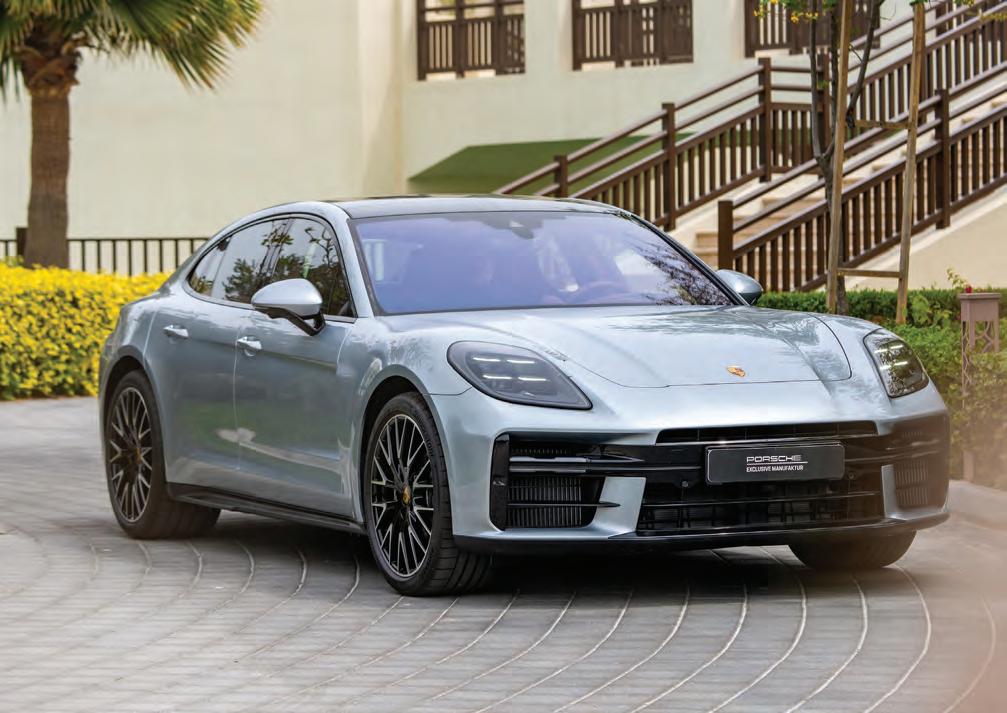
The Exclusive Manufaktur, Porsche’s factory in Stuttgart, Germany, takes customisation a step further by transforming iconic cars into unique personal expressions, whether it’s an aesthetic preference or a technical one. Inspired by Ferry Porsche’s belief,
“We place more value on building cars of quality than on building cars for quantity,” this programme creates exceptional vehicles tailored precisely to the owner’s wishes.
During a recent outing with Porsche Centre Bahrain, Gulf Insider got to explore two outstanding examples of this programme: the Taycan 4S and the
Panamera. Both cars were customised with exceptional care and remarkable attention to detail.
The Porsche Taycan 4S
Finished in Ice Grey Metallic, the Taycan 4S embodies Porsche’s modern elegance and futuristic appeal. Its Exclusive Manufaktur features include

Every detail, from stitching to final finishes, is performed by hand, ensuring uniqueness.
beautifully painted lower trims on the exterior mirrors in Ice Grey Metallic, high-gloss black window trims, and a panoramic roof with adjustable light control, perfect for setting the right mood inside the car.
Inside, the Taycan blends luxury with sporty style, featuring a stunning two-tone leather interior in black and Bordeaux red. Details such as the matte carbon steering wheel trim with built-in heating and personalised vehicle
keys that match the exterior colour emphasise the personalised luxury. Illuminated carbon matte door sill guards, personalised floor mats, and a Head-Up Display complete this refined package.
Painted in Dolomite Silver Metallic, the Panamera showcases Porsche’s customisation from a different but equally impressive angle. Striking high-gloss black wheels with polished surfaces and a sophisticated Club leather interior in Barrique demonstrate Porsche’s commitment to elegance and refinement.
The Panamera includes adaptive sports seats with 18-way electric adjustments, a panoramic roof, and elegant door handle inlays that match the exterior colour. Unique taillights and a carbon matte interior package paired with a heated leather GT sports steering wheel underline the perfect
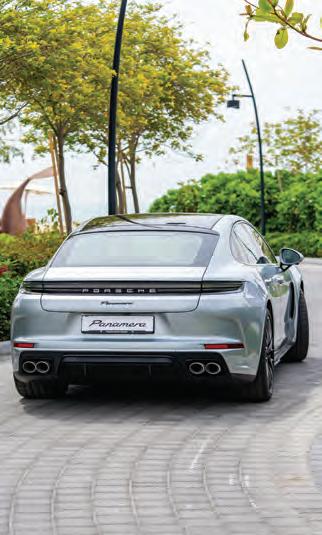
balance of sportiness and luxury.
Like the Taycan, illuminated door sill guards in carbon matte and a Head-Up Display highlight Porsche’s attention to combining style with practical functionality.
At Porsche Exclusive Manufaktur, advanced technology meets traditional craftsmanship. Skilled artisans carefully handle premium materials like leather, Alcantara®, carbon fibre, wood, and aluminium. Every detail, from stitching to final finishes, is performed by hand, ensuring uniqueness.
Even small elements receive extraordinary attention. The leather used by Porsche is sourced exclusively from Germany and Austria, carefully selected and thinned to precise specifications. This level of care ensures the interior is refined and comfortable.
Porsche Exclusive Manufaktur thrives on the creativity of its customers, working closely with Porsche’s Design Studio and engineers in Weissach. This partnership ensures continuous
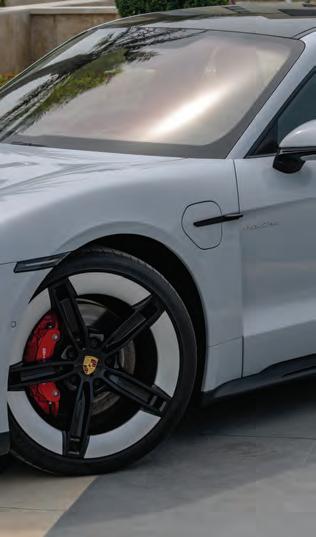
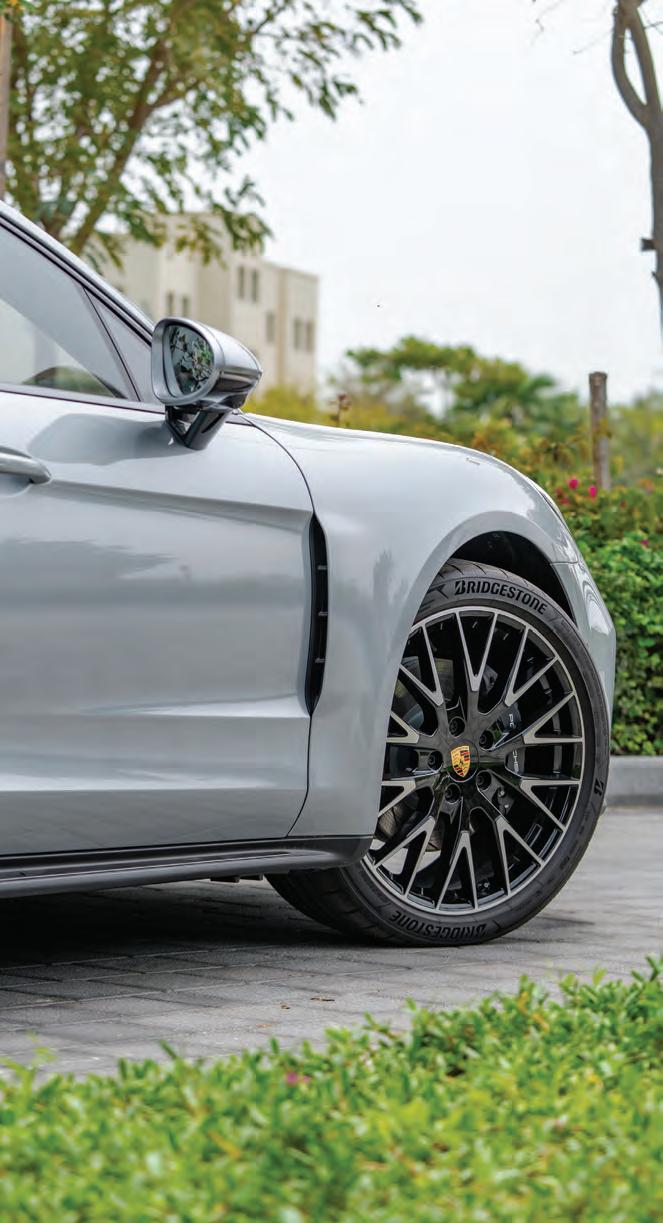
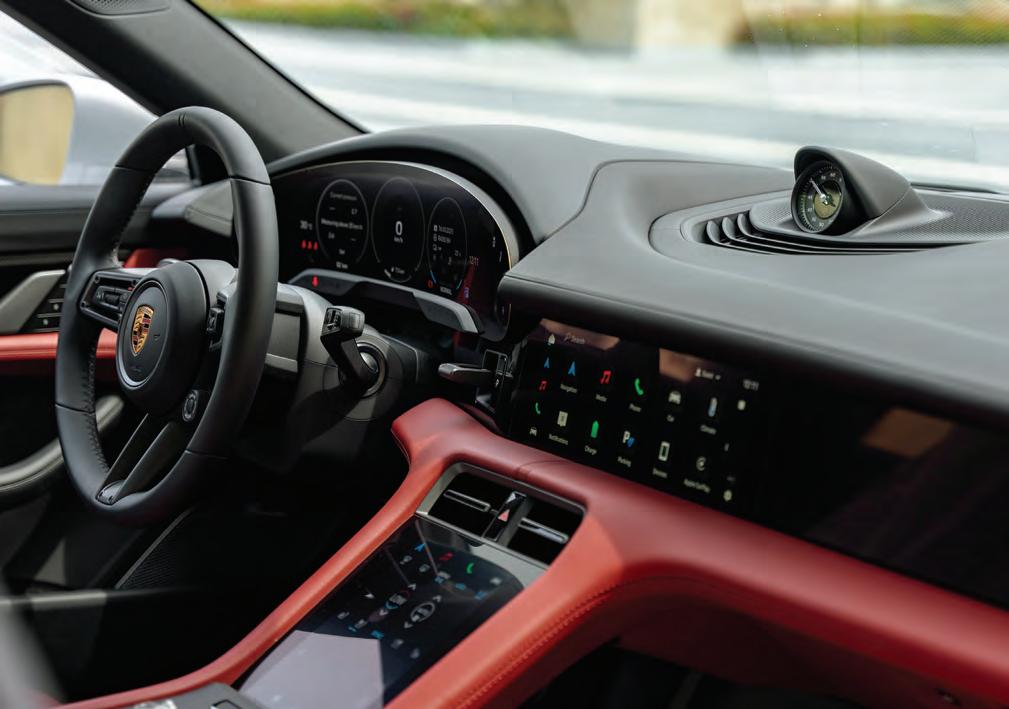
innovation and keeps the customisation programme dynamic and forwardthinking.
Each Porsche leaving the Exclusive Manufaktur workshop is a result of this creative collaboration, turning imaginative ideas into extraordinary realities.
In essence, Porsche Exclusive Manufaktur is about creating cars with a distinct personality and character, uniquely reflecting their owners. Our experience with the Taycan 4S and Panamera vividly confirmed this, showcasing Porsche’s seamless blend of luxury, innovation, and personal artistry.
To find out more about Porsche Exclusive Manufaktur, visit Porsche Centre Bahrain in Sitra or contact the dealer at +973 17459911
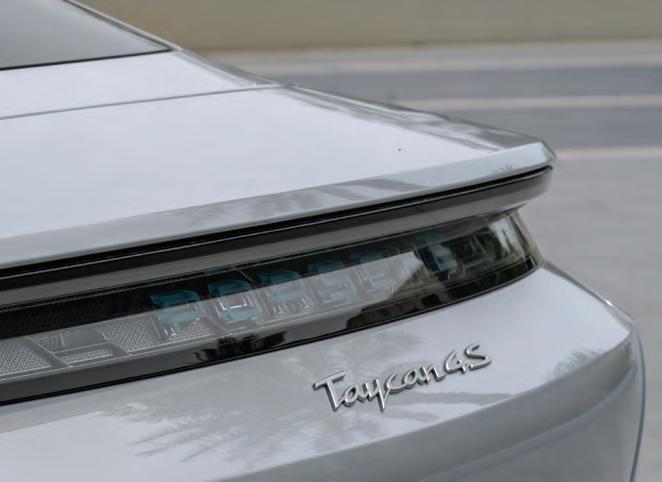
Inside Lamborghini’s heritage revival, Yazan Neme uncovers how Polo Storico preserves the Italian icon.

Like so many kids in the 1980s, I had a poster of the Lamborghini Countach on the wall of my childhood bedroom. My brother and I would cut pictures of supercars from magazines and tape them inside our closet, imagining ourselves driving them along the sunlit, winding roads of the Italian countryside. Decades later, that dream came
full circle. To celebrate the 10-year anniversary of Automobili Lamborghini Polo Storico - the division dedicated to preserving the brand’s legendary heritage - Gulf Insider took part in a special media event in Sant’Agata Bolognese. There, I experienced firsthand the incredible cars that inspired generations and saw how Lamborghini archives, certifies and restores these iconic machines.
We stepped back into history as participants drove four incredible machines through the rolling hills: the elegant 400 GT, the bold LM002, the roaring Diablo SE and the ultimate headturner - the Countach 25th Anniversary model. Back at the workshop, I got my hands dirty working on the Miura, arguably one of the most beautiful cars ever designed.
These cars tell the incredible story of

the brand: bold decisions, revolutionary design and innovative engineering –all wrapped in pure beauty. Nothing captures the Italian spirit quite like the raging bull of Lamborghini.
Seeing these cars together is a reminder of how many “firsts” Lamborghini achieved. The 400 GT, an evolution of the original 350 GT, was among the fastest, most refined grand tourers of its era, offering comfort and drivability that stood out from its peers.
Ferruccio Lamborghini famously founded the company after a dispute with Enzo Ferrari, aiming to build a more reliable, road-friendly sports car than the Ferrari he owned.
The Miura became the world’s first true supercar, introducing innovations like the mid-engine layout - now a staple in modern performance cars. Its legend was sealed in pop culture with The Italian Job (1969), where a bright orange Miura glides through the Alps, setting the standard for automotive elegance.
Next, the LM002 - the world’s first luxury SUV. Nicknamed the “Rambo Lambo,” it paved the way for today’s Urus. The Countach, with its wild lines, became the poster car of the 1980s and a cinematic icon in films like The Cannonball Run and The Wolf of Wall Street. Then came the Diablo - a 1990s classic and among the first production cars to break the 200 mph barrier.
Preserving this legacy hasn’t been easy. Lamborghini’s early decades saw financial troubles and shifting ownership. Today, its heritage is protected through three pillars: archiving, certification, and restoration.
Today, that legacy is being safeguarded through three main pillars: the archive, where everything begins; certification, and restoration.
The Polo Storico team includes expert mechanics, historians, and veteran
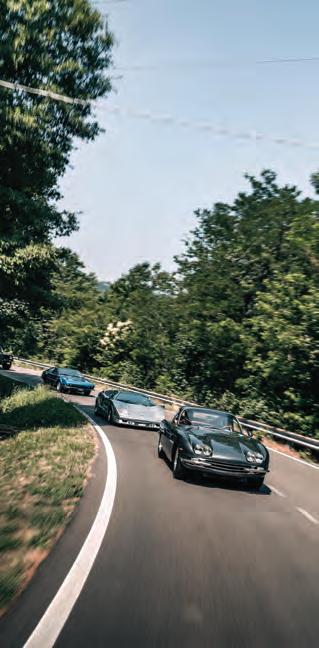
In addition to building the archive, the team offers a certification service for classic Lamborghini models.
employees, some from as far back as the 1960s. We saw a remarkable archive of hand-drawn sketches, production sheets, old invoices, and even original customer names.
Many of these documents were once thought lost, later found in forgotten storage rooms, or in the homes of retired staff who had quietly preserved pieces of Lamborghini’s history.
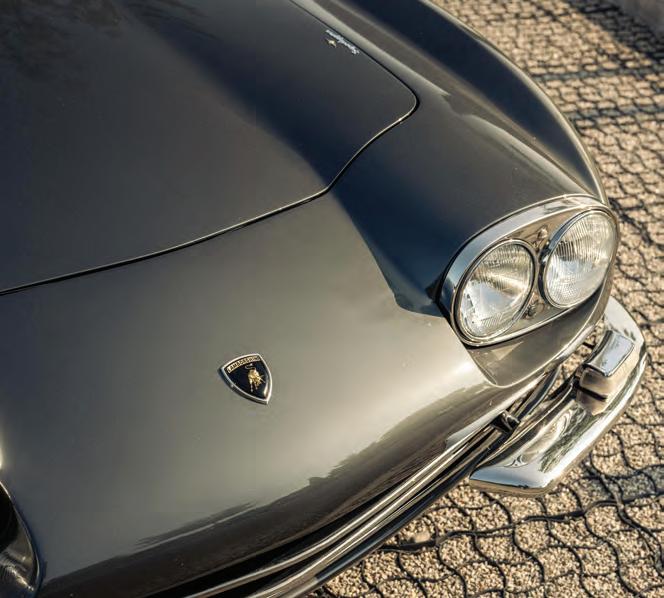
Alessandro Farmeschi, Lamborghini’s After Sales Director, explained: “For us, the archive means knowing the history of each and every vehicle. In the mass automotive market, there’s something called the ‘end of life’ of a product. For Lamborghini, this doesn’t exist. Every single car is a piece of art - a collectible. They’re assets, and we see our job as adding value to those assets.”
In addition to building the archive, the team offers a certification service for classic Lamborghini models. Each vehicle undergoes a detailed inspection and documentation process to verify its originality.
We saw how each car is meticulously examined and cross-referenced with historical records. It’s a labour-intensive job, but fascinatingly reveals each car’s unique story, tracing back to its factory origins.
Owners can also request full restorations. The dedicated mechanics that carry out this craftsmanship showed us the work being done on the Miura’s V12 engine.
Every component is fine-tuned
To stay true to each car’s original form, Lamborghini also partners with tyre manufacturer, Pirelli to recreate vintage tyres long out of production.
with incredible precision, factoring in everything from driving style to climatic conditions to deliver the ultimate performance.
To achieve this, the team uses a mix of modern and traditional tools, including one irreplaceable asset: the ears of Giancarlo Barbieri, who’s been with the factory since the 1960s and,
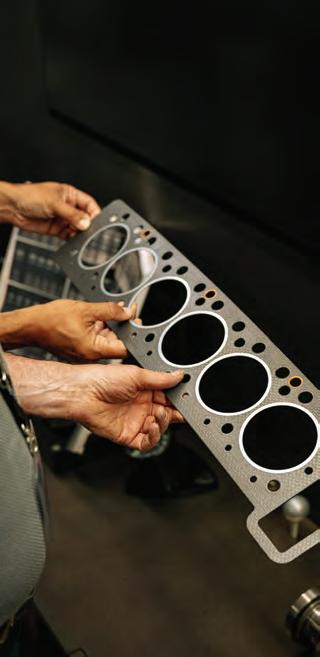

half-jokingly, claims his hearing is still more accurate than any modern diagnostic device.
Sourcing spare parts is a challenge in itself. If not found in old stock, the team searches the market. If that fails, they reach out to original manufacturers - or reverse-engineer the part themselves.
To stay true to each car’s original form, Lamborghini also partners with tyre manufacturer, Pirelli to recreate vintage tyres long out of production.
Mr Farmeschi further explained the philosophy behind their work: “We have certified only 200 cars so far and completed restoration on just 40. Our objective is not volume – it’s about doing things the right way.”
I also spoke with him about the Middle East market specifically. “We have many customers in the Middle East who own these collectible cars,” he said. “They’re part of some of the finest collections in the region. We have great relationships with them, and the Middle East is a key market for us.”
Naturally, having official certification from Lamborghini adds significant value to these vehicles, and the company is keen to work closely with Middle Eastern collectors. “The key word here is trust,” he added. “A recent study confirms that trust is one of the most important factors for collectors - you need to trust the seller and the history of the car. Our certification is the statement that ‘this is the car.’ That brings real value.”
As we left the event, Lamborghini’s latest models - the Urus, new Temerario, and Revuelto - were parked outside. It was hard not to wonder if these high-tech machines will ever evoke the same raw emotion as the classics we’d just seen.
Lamborghini is embracing electrification, but not just for lower emissions. For them, electric tech is a means to elevate performance. So far, it’s proving true. Only time will tell if today’s lineup will become tomorrow’s icons, inspiring future generations like the Miura or Countach did.
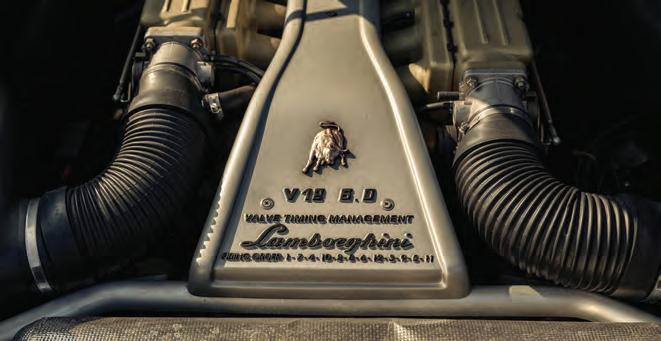
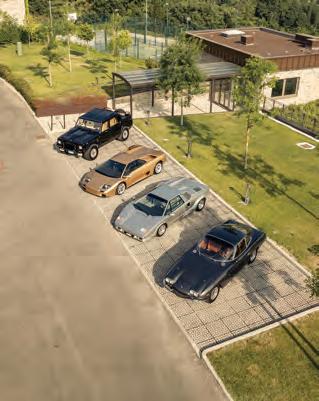


Charlie Cooksey experiences Ferrari’s Corso Pilota at the home of the Italian brand.
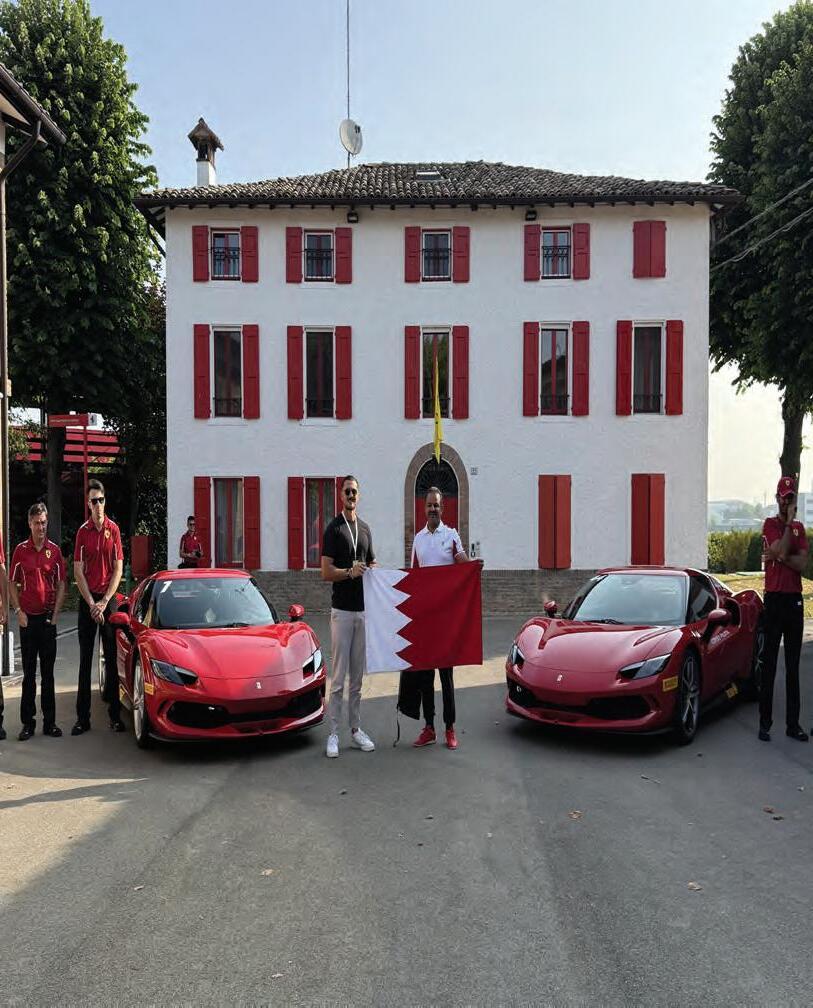
I’ve driven a lot of cars in a lot of places. But nothing quite prepares you for driving a Ferrari on its home turf, Fiorano. I was invited to attend Corso Pilota, Ferrari’s official driving course, hosted in the heart of Maranello.
This town isn’t just the home of Ferrari. It is Ferrari. Red flags flying,
car-shaped chocolates in cafés, and the unmistakable hum of engines in the air - it’s everywhere. Maranello lives and breathes the Prancing Horse.
Corso Pilota is about learning to drive a Ferrari properly. I took the wheel of a 296 GTB and hit Fiorano, Ferrari’s private test track built by Enzo himself in the 1970s. With an instructor beside
me each lap, I got real-time coaching through every corner.
The best part was the data. After a few laps, I’d hand in a chip from the car and sit with a specialist. They broke down my driving line by line. Turns out, what felt right wasn’t always fastest. Their advice worked. I was shaving off seconds every session.

Over two days, I drove more track miles than ever before. It was pure adrenaline, total focus, and absolute joy. The 296 GTB was sharp, agile, and addicting.
I also got to drive the new Ferrari 12Cilindri through the Italian countryside. Smooth roads, perfect weather, and a car that responded to every input with elegance and power. It was a dream.
Corso Pilota is more than a course. It’s a rare glimpse into Ferrari’s DNA. If you’re ever lucky enough to attend, take it. It’s an immersion. It’s a thrill. It’s Ferrari.
To experience the Ferrari Corso Pilota, contact 17734734 or visit www.bahrain. ferraridealers.com

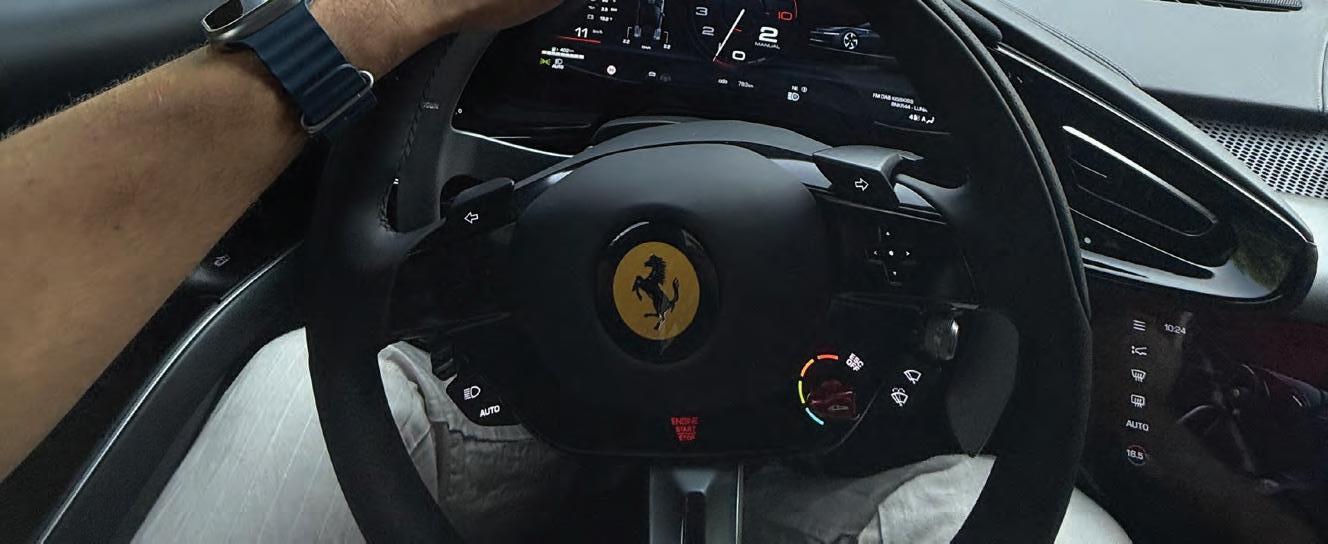

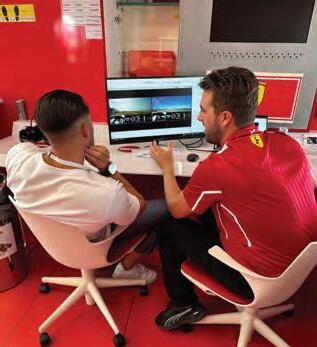
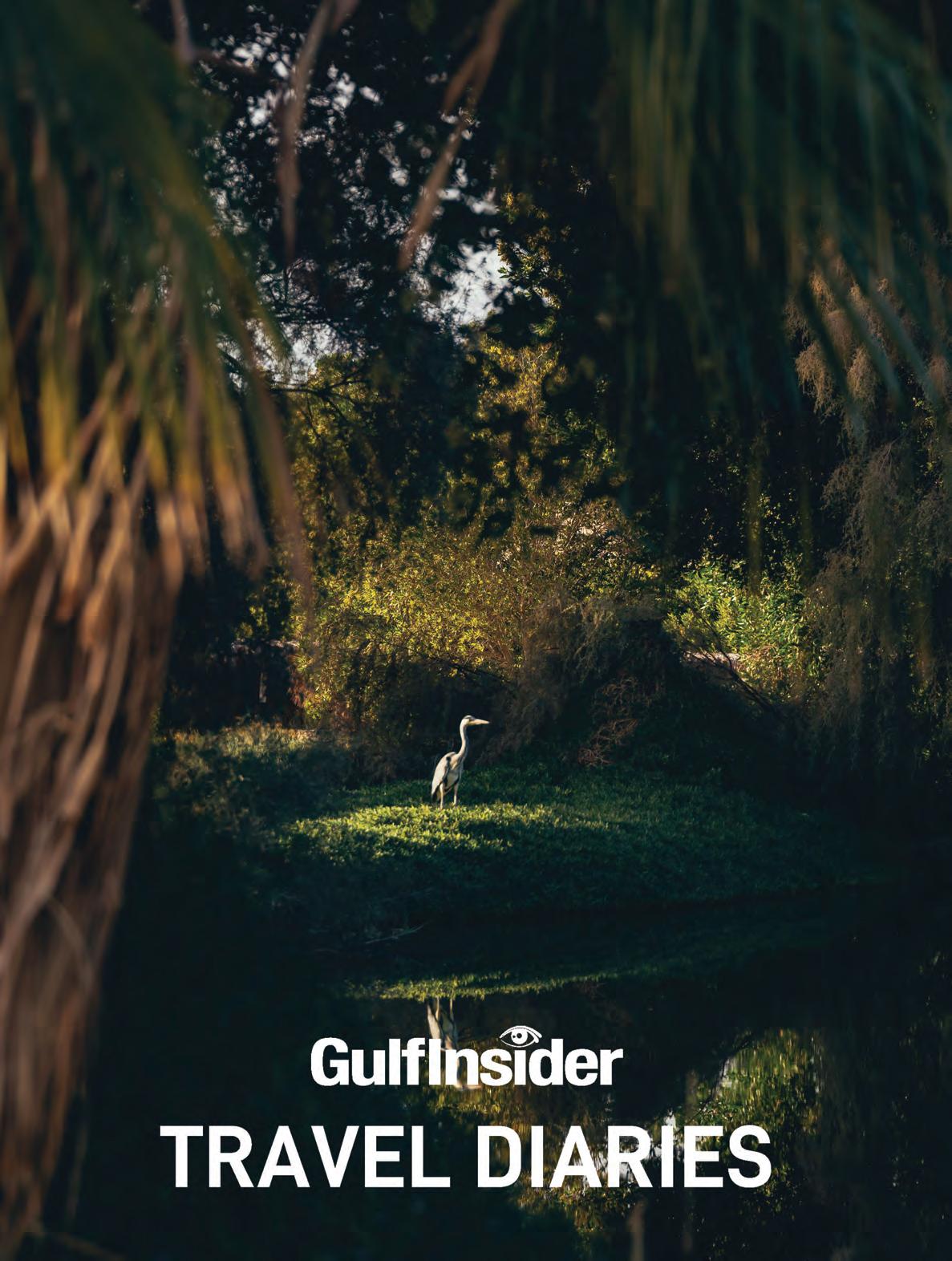
Egypt’s Red Sea coast houses a luxurious, self-contained resort town, El Gouna. The property has soon emerged as a premier destination for investment. Gulf Insider finds out why.

Nestled along Egypt’s Red Sea coast, El Gouna is a luxurious, fully integrated town that has emerged as a premier destination for property investment. Often dubbed the “Venice of Egypt” due to its intricate network of lagoons, El Gouna offers a unique blend of serene coastal living, world-class amenities, and strong investment potential.
The community is home to a variety of sought-after amenities, including hotels, restaurants, marinas, golf
courses, banks, health and wellness facilities, international education institutions, co-working spaces and more.
Here’s why investing in El Gouna is a smart choice, along with key details about its distinct features, property types, future plans, property management services, green initiatives, and travel options from Bahrain and other Gulf countries.
Unlike many other developments, El Gouna is a fully integrated, privately managed town developed by Orascom
Development since 1989. Located just 20 kilometres north of Hurghada International Airport, it combines awardwinning architecture with a vibrant, international community of residents representing over 50 nationalities, families, entrepreneurs, affluent Egyptians, expatriates, and retirees.
Its unique lagoon system builds proximity of some premium neighbourhoods to the open sea, offering waterfront views for most properties, while its year-round sunshine, pristine beaches, and
proximity to Hurghada set it apart.
El Gouna’s gated, curated environment ensures a safe, clean, and relaxed lifestyle, distinct from the busier, more tourist-heavy Hurghada. With top-tier infrastructure—highspeed internet, reliable utilities, and eco-friendly transport like tuk-tuks - El Gouna feels like a luxurious haven brimming with coastal serenity.
Gulf Insider sat down with Mr. Mohamed Amer, CEO at El Gouna, who shared with us the unique allure of El Gouna and why it’s capturing the attention of global real estate investors.
Mr. Amer told us that El Gouna has emerged as a world-class destination due to its natural beauty, diverse entertainment (such as the El Gouna International Film Festival), and sustainable development has fostered a vibrant, multicultural community.
Mr. Mohamed Amer, CEO at El
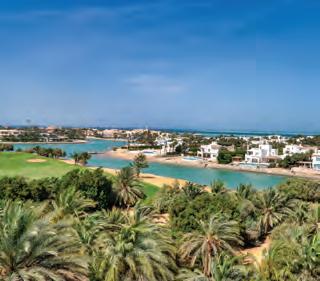

Gouna, highlighted why the community is capturing the attention of global real estate investors.
Mr. Amer highlighted the strong demand from international buyers, which drives high returns on investment (ROI) for homeowners. He explained that El Gouna stands out as the only
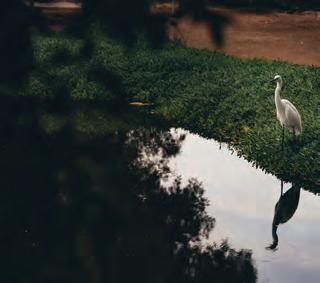

Egyptian real estate project pricing its residential offerings in U.S. dollars, a strategy that shields investors from currency fluctuations.
El Gouna offers a diverse range of properties catering to various budgets and preferences. Options include:
Villas: Spacious standalone or twin villas, often with private pools, gardens, and sea or lagoon views, are popular among affluent buyers.
Townhouses: Ideal for families, these offer privacy and communal amenities.
Apartments and Penthouses: Modern, fully furnished units with lagoon or golf course views range from 47 to 200 square meters.
Chalets and Duplexes: These provide cosy, stylish options, often in vibrant neighbourhoods.
El Gouna is only about 50% developed, leaving significant room for growth and value appreciation. Orascom Development, which owns one of Egypt’s largest land banks, continues to expand the town with projects like Ancient Sands Resort, featuring villas and apartments with golf course views, and Kamaran El Gouna, a family-friendly neighbourhood with

modern homes and serene sand pools.
Recently, Orascom Development introduced two of El Gouna’s newest waterfront real estate projects in a special showcase held in the UAE. Fanadir Shores and North Bay are designed to offer premium coastal living.
Fanadir Shores features 57 residential units along a private lagoon with direct access to the Red Sea, while North Bay offers larger standalone and twin villas with direct sea access and open lagoons with private boat docks. Both projects are scheduled for delivery within a two-year timeframe.
Behind these community-focused developments is a research-led initiative, “Keys of Life”, revealing insights into the evolving needs and aspirations of people around the world. Findings from the initiative help inform the town’s evolving design and offerings with an aim to elevate customer experiences.
El Gouna Plus, one of the town’s community offerings, provides comprehensive property management services, making ownership hasslefree. This includes maintenance, landscaping, security, and rental management for investors seeking short-term rental income (2-8% ROI).
The service ensures properties
are well-maintained and marketed effectively, maximising returns for absentee owners. Owners also receive an “Owners Card,” granting discounts at restaurants, access to hotel pools and beaches, and other perks, enhancing the lifestyle and investment value.
El Gouna is a pioneer in sustainability, integrating eco-friendly practices into its development. Initiatives include solar energy projects, water recycling systems, and eco-conscious transportation like electric tuk-tuks.
The town’s “Green Gouna” program promotes waste reduction, energy efficiency, and sustainable building materials, ensuring a low environmental footprint while maintaining luxury. These efforts appeal to environmentally conscious investors and enhance the town’s long-term appeal.
Travelling to El Gouna from Bahrain and other Gulf countries is straightforward, with Hurghada International Airport serving as the gateway, and airlines like Emirates, Flydubai, and EgyptAir offering regular services.
With tickets for a round-trip costing $400-$600 (depending on the departure port), El Gouna is a 30-minute transfer by taxi or shuttle from Hurghada Airport.
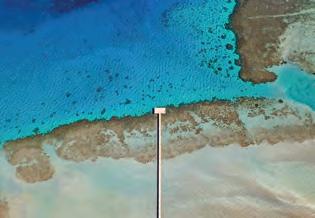
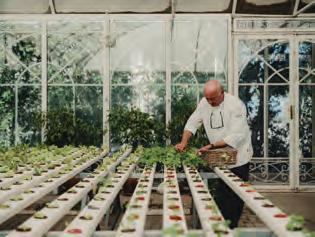
A tourist visa is required if you’re not a citizen of the US or the UK. Check your visa-on-arrival eligibility before travelling to El Gouna.
El Gouna offers a luxurious lifestyle. It also offers strong rental yields and capital appreciation for property owners due to ongoing development and high demand from international visitors. Its unique blend of modern amenities, natural beauty, and eco-conscious growth makes it a standout choice for investors from the Gulf and beyond.
With straightforward purchasing processes for foreigners and robust property management, El Gouna could be both a dream home and/or a savvy investment.
For more information, visit www.Elgouna.com
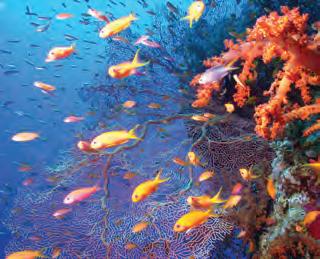
Luxury meets history at two iconic hotels in the city and a limited-edition culinary experience promises a flavourful journey, curated by three chefs.

In a city as storied as London, choosing the right hotel is about more than location. It is about finding your rhythm in a place that moves fast but always has time for tea. For those looking to explore the capital with a balance of comfort, elegance and experience, two properties stand out for very different reasons.
Tucked into one of Mayfair’s quieter corners, the London Marriott Hotel Grosvenor Square offers something increasingly rare in central London: space, calm and a reassuring sense of familiarity. It was the first-ever Marriott to open in London in 1985 and still holds onto its original warmth.
The location is ideal, just a five-
minute walk from Oxford Street yet removed from the hustle. Surrounded by boutiques, leafy squares and local cafés, it is perfectly placed for those who want access without the noise.
Rooms are surprisingly spacious and thoughtfully designed. Some feature private balconies, which are a bonus in Mayfair. Interiors blend modern comfort with classic touches, and business
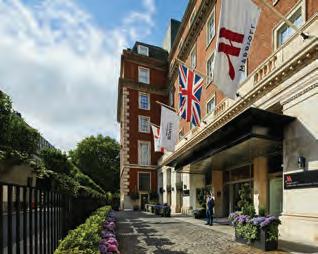
travellers should consider Club-level rooms for access to the M Club, a peaceful lounge with breakfast and allday snacks.
The hotel has a strong dining history, once home to Maze by Gordon Ramsay. Today, the Gordon Ramsay Bar & Grill and the lively Lucky Cat keep that reputation alive.
With a well-equipped gym,
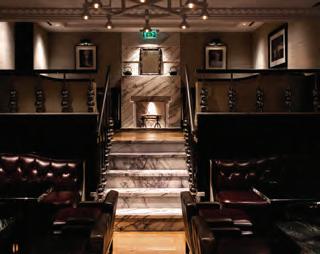
consistently warm service and a setting that lets you recharge, the Marriott Grosvenor Square is a grounded option for travellers who want quality over flash. Whether in town for business or leisure, this hotel feels like your own pocket of Mayfair.
For bookings and enquiries, contact London Marriott Hotel Grosvenor Square at +442074931232
Overlooking Green Park on Piccadilly, the Sheraton Grand London Park Lane is steeped in Art Deco elegance. From the marble floors to the sweeping staircases, the design sets a glamorous tone from the moment you step inside. The hotel knows what it is and plays to its strengths.
Location is another plus. Just steps from Green Park Station and walking distance to Hyde Park, Mayfair and the West End, the hotel is well-positioned for both work and play.
The experience is elevated by the standout Great Gatsby Afternoon Tea, served in the vaulted Palm Court. Inspired by The Great Gatsby: A New Musical, the menu is more performance than meal.
Think smoked salmon tarts, truffled



salads and desserts like Daisy’s Tropical Choux and a decadent Gatsby Forest Gâteau. The string quartet in the background adds to the atmosphere without overwhelming it. Sparkling Saicho tea offers a sophisticated non-alcoholic pairing, though themed cocktails like the Green Light Martini are available too.
The gym is large, clean and fully equipped, not always the case in heritage hotels. Bonvoy members also get access to a quiet Club Lounge, a welcome option between meetings or sightseeing.
Sheraton Grand London Park Lane delivers thoughtful luxury with a side of nostalgia. It is elegant, spacious and never overdone.
For bookings and enquiries, contact Sheraton Grand London Park Lane at +442074996321

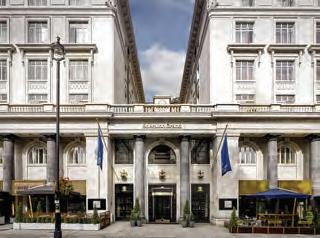
For a limited time, The Peninsula Hotels is hosting Three Chefs, Three Feasts, a landmark culinary collaboration celebrating European cuisine through a six-course tasting experience.
The London edition takes place on 30 September at Brooklands by Claude Bosi at The Peninsula London. It features two exclusive dishes each from Chefs David Bizet, Claude Bosi and Francesco Dibenedetto, highlighting regional flavours and personal culinary stories.


Set high above Belgravia with views over London, Brooklands combines British heritage with French finesse. The setting, filled with aviation and motorsport memorabilia, adds another layer to the storytelling.
Each course is presented by the chefs themselves, turning the evening into a multisensory journey. Limited to just 46 guests, the dinner is priced at £295 per person.
For reservations and further details, contactThe Peninsula London at +442039592888
Nick Cooksey enjoys a masterclass in relaxation at the InterContinental Maldives Maamunagau Resort.

As I stepped off the seaplane onto the floating dock at InterContinental Maldives Maamunagau Resort, the turquoise expanse of the Indian Ocean stretched endlessly before me. The warm Maldivian breeze and the gentle lapping of waves instantly melted away the stresses of life.
Nestled in the pristine Raa Atoll, this private island paradise delivered an experience that was both luxurious and soul-recharging, making it a perfect getaway for Gulf residents.
Travelling to Maamunagau from Bahrain and other GCC countries is seamless, thanks to frequent flights to Velana International Airport (MLE) in Malé. From Bahrain, I took a direct flight with Gulf Air, a quick 4.5-hour journey.
Depending on the season, several airlines like Emirates, Qatar Airways,
and Flydubai also connect Dubai, Doha, and Riyadh to Malé, with flight times and prices ranging from $400$600. Booking early or during off-peak months often secures better deals.
Upon landing in Malé, the resort arranges a 35-minute seaplane transfer to Raa Atoll, costing approximately $290-$700 round-trip per person, included in some packages if you stay four nights or more. The seaplane ride itself is a highlight, offering breathtaking aerial views of scattered atolls and sapphire waters.
Alternatively, a 20-minute domestic flight to Dharavandhoo Airport followed by a 35-minute speedboat ride is available for late arrivals, though I preferred the seaplane’s scenic charm. The resort’s staff greeted me at Malé with a warm smile and escorted me to a private lounge, ensuring a smooth transition.
Arriving at Maamunagau, I was struck by the resort’s serene beauty. Soft white sands, palm-fringed terraces,
The resort, the first all-club InterContinental property, offers 81 villas, each with Maldivian-inspired interiors and private pools.

and a vibrant house reef teeming with marine life set the stage for an unforgettable stay. The resort, the first all-club InterContinental property, offers 81 villas, each with Maldivian-inspired interiors and private pools.
I stayed in a One-Bedroom Pool Villa, priced at around $1,200 per night. The villa’s infinity pool seemed to blend into the ocean, and I spent mornings sipping coffee on my balcony.
All guests enjoy Club InterContinental benefits, including a lavish à la carte breakfast, multi-tiered afternoon tea, evening aperitifs, and all-day refreshments at The Retreat and Pool Bar. These perks made every moment feel indulgent without the worry of extra costs piling up.
Dining at Maamunagau is a culinary journey. At The Fish Market, I savoured sea-to-table South Asianinspired dishes, like tuna carpaccio. The Lighthouse, a stunning overwater dome, offered fine dining with delicious lobster ravioli. Café Umi’s sushi and The Sunset Bar’s cocktails added variety, with six dining venues ensuring every meal was a delight.
The resort’s proximity to a manta ray sanctuary was a highlight. I joined a snorkelling excursion, swimming alongside mantas.
Non-motorised watersports, like kayaking, were complimentary, while
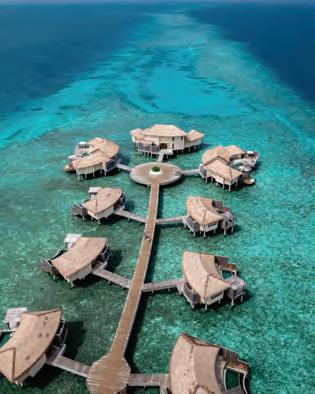

For Gulf travellers, the short flight and visa-onarrival make it an accessible escape.
jet skiing and e-foiling added thrills for a fee. The AVI Spa, perched over the lagoon, blended Ayurvedic treatments with Maldivian botanicals, and my ocean-facing massage was pure bliss. For families, the Planet Trekkers Kids Club kept younger guests entertained with marine-themed activities.
What sets Maamunagau apart is its commitment to sustainability. The resort’s Green Engage initiatives, like solar production and coral nursery planting, align with its eco-conscious ethos. Biking around the island, I appreciated the lush greenery and the beauty of the island.
The tranquil setting, far from the crowded resorts, and the healthy house reef teeming with reef sharks and eagle rays made every snorkel a vibrant adventure.
My stay at InterContinental Maldives

Maamunagau was a masterclass in relaxation. Prices, while premium, reflect the all-inclusive perks and personalised service, from pre-arrival questionnaires to attentive staff like my curator, who tailored my itinerary.
For Gulf travellers, the short flight and visa-on-arrival make it an accessible escape. Whether you’re a honeymooner, family, or solo adventurer, this resort delivers lifelong memories.
For more information, visit www. maldives.intercontinental.com Image Credits: InterContinental Maldives Maamunagau Resort
New names, returning favourites, regional spotlights, and empowering future talent - the World 50 Best Restaurants 2025 celebrated iconic dining establishments and the people behind them, around the globe.

The culinary world gathered in Turin, Italy, to unveil The World’s 50 Best Restaurants 2025, and this year’s list is a delicious itinerary in itself. With 22 countries represented across five continents, the list celebrates innovation, sustainability, culture, and most importantly, unforgettable flavours.
Maido Takes the Crown
Claiming the top spot is Maido in Lima, Peru. Chef-owner Mitsuharu Micha Tsumura’s temple of Nikkei cuisine blends Japanese precision with Peruvian soul.
From the moment you are greeted with “Maido”, a warm Japanese
With 22 countries represented across five continents, the list celebrates innovation, sustainability, culture, and most importantly, unforgettable flavours.
welcome, you are taken on a flavour journey through more than ten intricately crafted courses.
Climbing from number five last year to the pinnacle, Maido dethrones 2024’s winner, Disfrutar in Barcelona, which now joins the Best of the Best hall of fame.
Following close behind are Asador Etxebarri in Spain at number two, known for its mastery of wood-fired simplicity, and Quintonil in Mexico City at number three, offering vibrant Mexican dishes rooted in sustainability and locality.
New Entries and Rising Stars
This year, ten restaurants made their debut on the list. Bangkok shines with


Potong at number thirteen and Nusara at thirty-five. Italy’s Atelier Moessmer Norbert Niederkofler lands at number twenty, while Lima celebrates again with Mérito at number twenty-six. Other newcomers include Lasai in Rio, Enigma in Barcelona, Kadeau in Copenhagen, Vyn in Sweden, Celele in Cartagena, and Restaurant Jan in Munich.
Re-entries include Narisawa in Tokyo, Le Calandre in Rubano, Orfali Bros in Dubai, and La Cime in Osaka; proving that culinary excellence is not a onetime feat.
Bangkok’s Potong also picked up the Highest New Entry Award, while
London’s Ikoyi jumped an impressive 27 spots to number fifteen, earning the Highest Climber Award.
The awards are not just about where to eat but who is shaping the future of food. Albert Adrià of Enigma received the Chefs’ Choice Award, voted for by fellow chefs. Maxime Frédéric of Cheval Blanc Paris was crowned the World’s Best Pastry Chef for his extraordinary craftsmanship.
Massimo Bottura and Lara Gilmore were honoured with the Icon Award for their work both inside and outside the kitchen, running Osteria Francescana

and launching social initiatives like Food for Soul.
The Sustainable Restaurant Award went to Celele in Colombia, recognised for its commitment to local sourcing and preserving Caribbean culinary traditions.
The World’s Best Sommelier Award was presented to Mohamed Benabdallah of Asador Etxebarri, whose expertise in wine pairing enhances the restaurant’s minimalist approach.
The 50 Best Restaurants Scholarship returned this year with Angélica Ortiz from Colombia taking the prize. She will train at El Celler de Can Roca in Spain and SingleThread in California, gaining hands-on experience in sustainability and seasonality at two of the world’s top dining destinations.
Special awards announced earlier this year also received recognition. Mindy Woods, chef and owner of Karkalla On Country in Australia, was named a Champion of Change. Chef Pam from Potong was recognised as the World’s Best Female Chef. Wing in Hong Kong won the Art of Hospitality Award, and Khufu’s in Cairo was named Resy’s One to Watch.
While attending the World 50 Best Restaurant Awards, Charlie Cooksey stayed at the charming Principi di Piemonte in the surprisingly gorgeous Italian city - Torino.
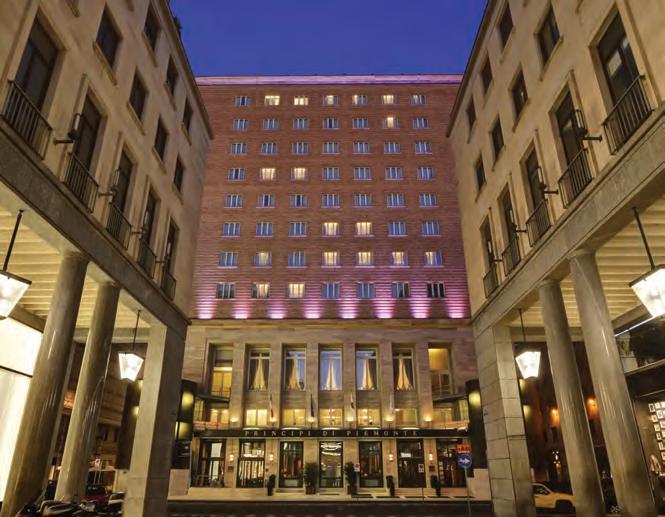
It was my first time in Torino, and to be honest, I wasn’t expecting to be this taken by the city. I flew into Milan and drove down, a scenic hour and a half on a straight motorway that suddenly opened up into one of the most charming cities I’ve ever seen.
Torino felt like a hidden gem, a place that doesn’t get the spotlight it deserves. Most people flock to Rome or Milan, but Torino’s classic architecture, buzzing streets, and relaxed café culture made it a truly beautiful hidden gem.
I stayed at the Principe di Piemonte Hotel, right in the city centre. The building was old in the best way, elegant, well-kept, and full of Italian charm. My room overlooked one of Torino’s bustling high streets; I’d wake
Most people flock to Rome or Milan, but Torino’s classic architecture, buzzing streets, and relaxed café culture made it a truly beautiful hidden gem.
up, open the windows, and watch the city come to life below.

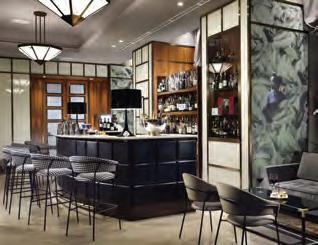
Everything I needed was there: a super comfortable bed, marble bathroom, walk-in closet for my tux, and a breakfast spread that had me lingering each morning.
The hotel’s spa surprised me. The sauna in particular was a highlight, spacious, clean, and perfectly quiet. I’ve been into several saunas lately, and this was one of the best I’ve tried.
The location was the true winner. I didn’t need a cab, scooter, or even a plan. I just walked. Early mornings spent watching the city wake up were some of my favourite moments.
Of course, the reason I was in town was the World’s 50 Best Restaurant Awards, an unforgettable gathering of culinary excellence. But what stayed with me just as much was the magic of Torino itself. I can’t wait to be back.

A lush escape just a short flight away, the Seychelles offers soulful stays, vibrant flavours, and green surroundings. Gulf Insider savoured a memorable experience across three distinct Hilton retreats on the Island.

If Paradise has an address, it might just be the Seychelles. Lush green hills, winding roads without a motorway in sight, and pristine, clear seas that change colour as the day shifts. It’s the kind of place you let soak in slowly, over good food, quiet mornings, and the occasional surprise like a cannonball-shaped fruit growing from a tree.
For anyone travelling from the Gulf, the Seychelles is only a short flight away. After a quick stopover in Dubai, we flew Emirates for about five hours to get to Mahé.
Over the week-long holiday, we stayed at three Hilton properties, each one with a personality of its own. Together, they gave us a rounded picture of the island: serene, luxurious, and deeply green.
Tucked away on the southwest coast of Mahé, Mango House felt like staying at a beautiful seaside estate. It’s not large – just 40 water villas – and it seems intentional. Our
room opened up to the bay of Anse Aux Poules Bleues, and we’d wake up each morning to the view of the water turning from deep blue to teal before breakfast.
Evenings were best spent at Kokoye, the hotel’s bar where we learned a thing or two about rum and spice during a cocktail masterclass. Dinner at Moutya was full of punchy Creole flavours – spiced fish, smoky sauces, and just enough heat to make things interesting.
There’s a rhythm to this place. Even the rain here seemed well coordinated.
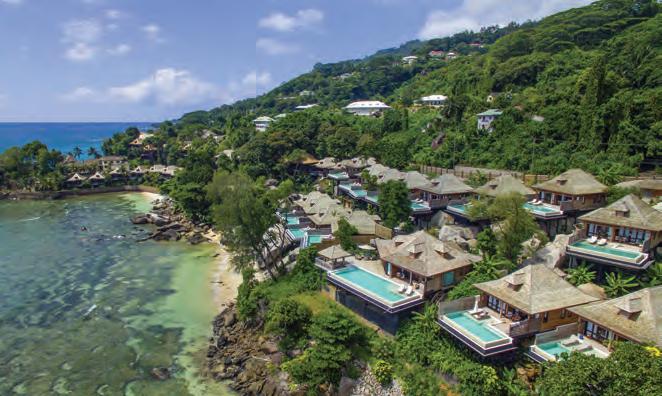
The Seychelles is wildly green, quietly luxurious, full of life and laid-back at the same time.
It would pour for an hour, and within thirty minutes, the ground would be dry again. The island breathes through short bursts of weather, keeping everything lush.
Our next stop, Canopy Seychelles at Anse La Mouche, had a completely different feel. More upbeat, with more people and more movement, but still, unmistakably island. The cats roaming the resort say a lot about this place: relaxed, well-fed, and not in any hurry to be anywhere else. They’ve made this slice of paradise home, and it seems to suit them just fine.
One of the highlights here was the Avocet restaurant, which effortlessly blends Creole and French cuisine without trying too hard. Breakfasts were generous, lunches were lazy, and the drinks always had a little kick.
Afloya Spa gave us a gentle nudge into full-on holiday mode with tailored

treatments, and we rounded off most evenings with a tasting experience, predinner drinks, or just watching the sky change colour over the bay.
Our final stay was at the Hilton Seychelles Northolme, a secluded resort nestled into the hillside with villas on stilts peeking out over the ocean. Mornings started with breakfast at Mahe Restaurant, where we’d linger a little longer just to watch birds picking at the crumbs we scattered under the table.
Snorkeling was on the cards too. The waves kept us on our toes, but the water was clear and warm, and the coral was full of life. It’s one of those small moments you don’t plan for but end up remembering most.
We wandered through the resort’s
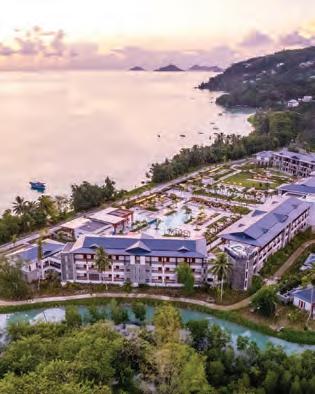
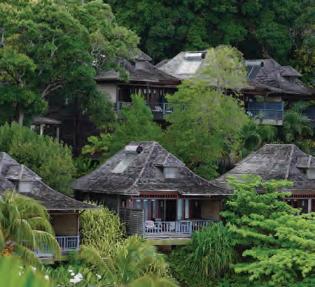
fruit garden one afternoon with a little map in hand. The highlight? A strange, dense fruit called the cannonball, heavier than it looks, rare even on the island, and oddly satisfying. Nature was flexing, as it often does on this island.
The Seychelles is wildly green, quietly luxurious, full of life and laid-back at the same time. Each of the three hotels felt different, but none felt out of place. Having visited the Maldives, it was pleasantly surprising to see what sets the Seychelles apart – there’s more terrain, more culture, more rhythm. When you leave, you do so slower than you arrived and lighter too.
For more details on the resorts, visit: Mango House Seychelles, LXR Hotels &Resorts|CanopybyHiltonSeychelles |HiltonSeychellesNortholmeResort & Spa
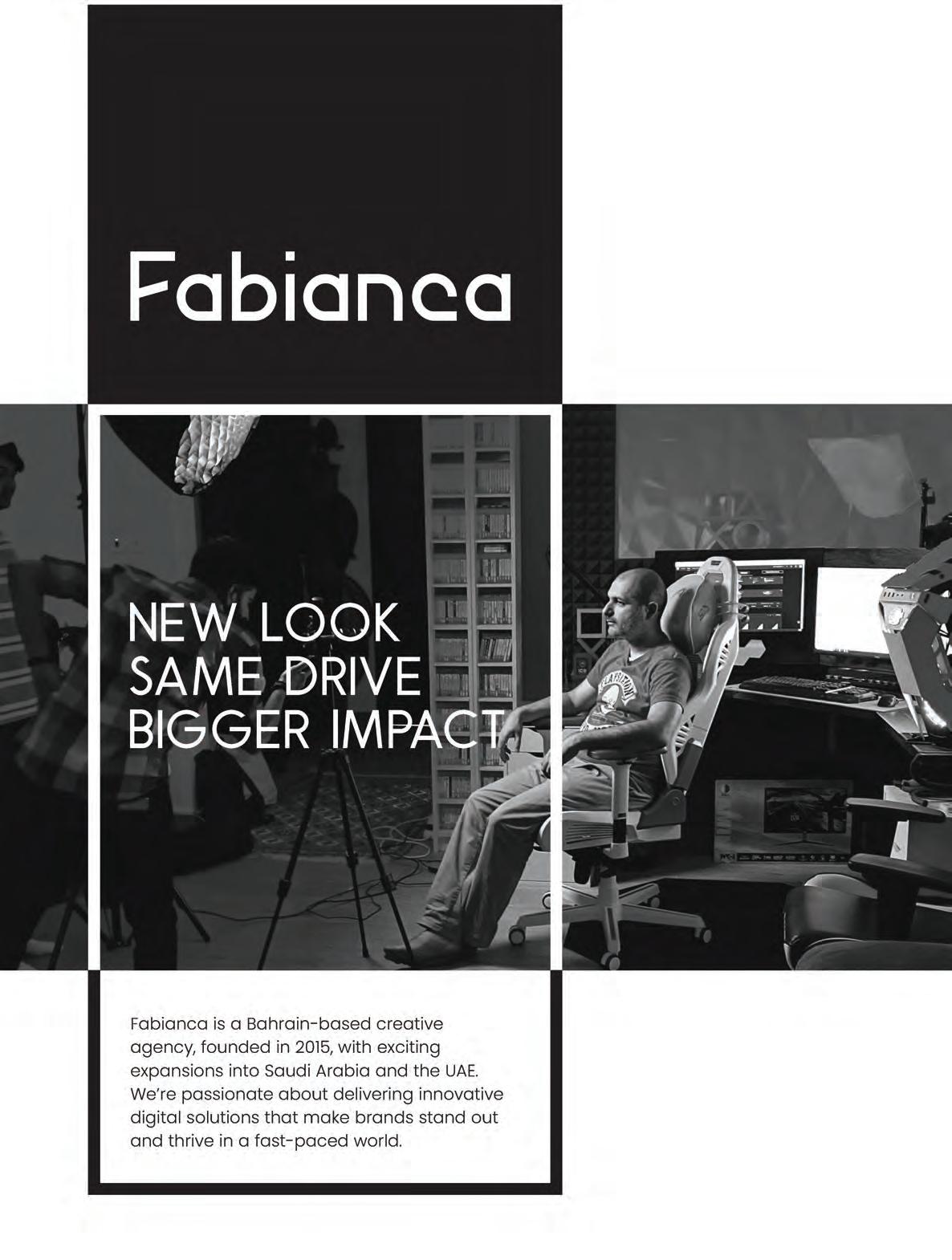

People, culture, and events - snapshots from some of the most talked-about events in Bahrain.
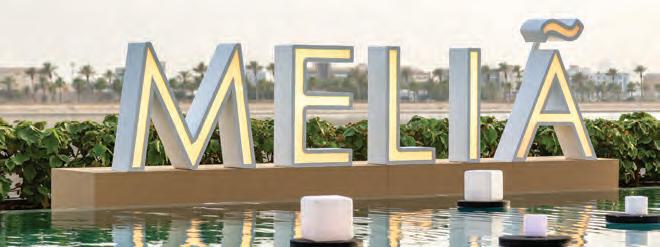
Melia Beachfront has officially opened on Amwaj Islands, introducing luxury residences, a five-star hotel, and a private beach to Bahrain’s coastline.
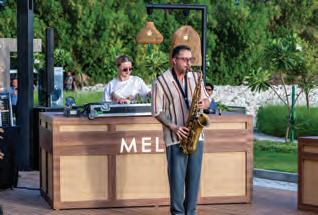
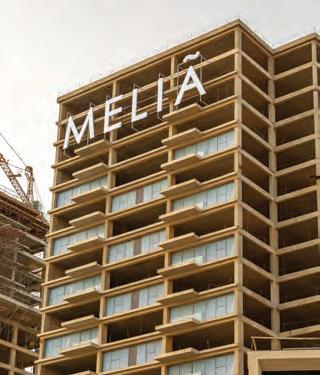
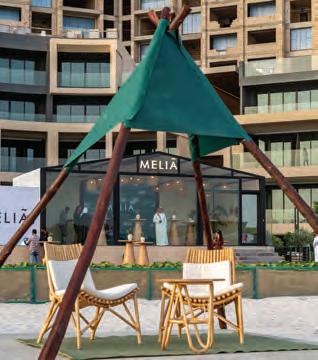

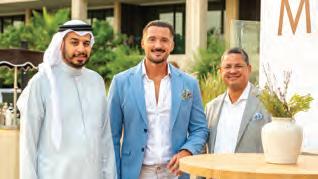
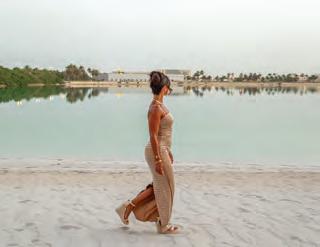
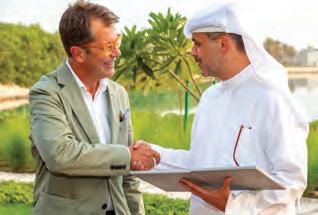
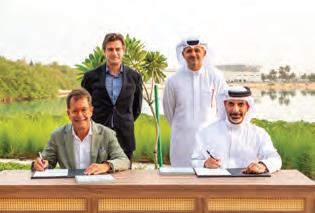

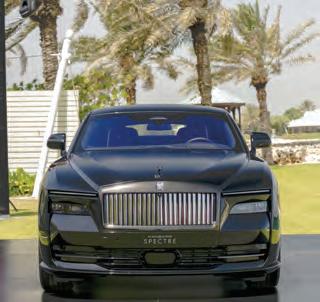

The Black Badge Spectre was revealed at The Ritz-Carlton, Bahrain, where the iconic brand’s breathtaking lineup offered a thrilling drive experience, set against a stunning backdrop.

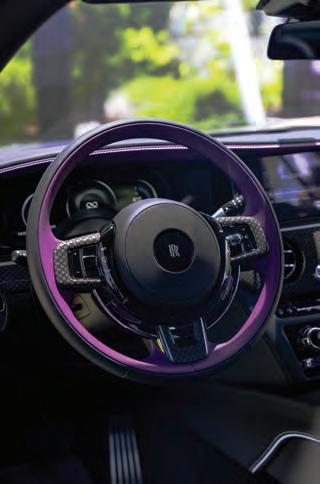



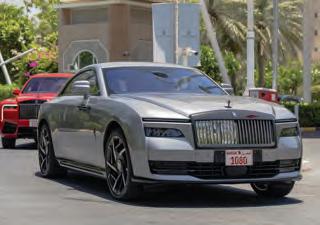

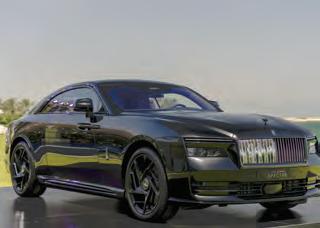

Mercedes Benz-Bahrain hosted an exclusive screening of F1: The Movie, starring Brad Pitt, Damson Idris, and Javier Bardem at EPIX Cinemas.


Brasero Atlántico officially opened at Sheraton Bahrain Hotel this year, unveiling an authentic experience with fiery flavours that journeyed their way from Buenos Aires to Manama.
